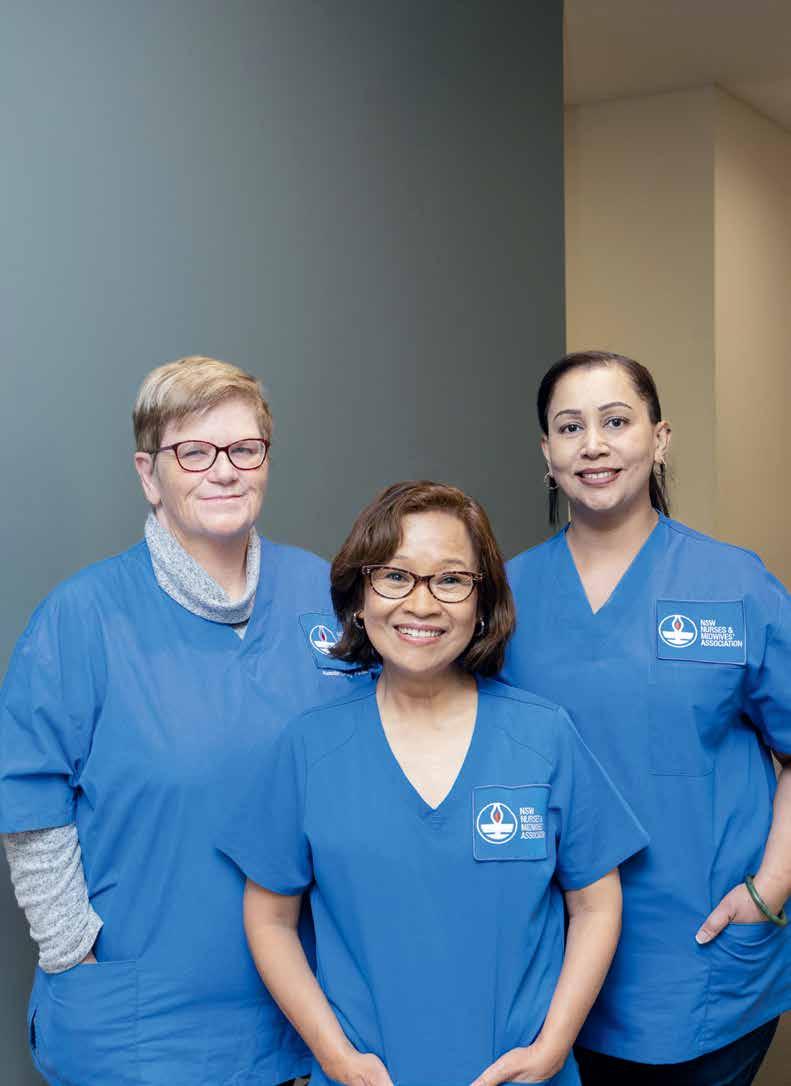
AGED CARE’S $11.3 BILLION PAY RISE REGULARS Your letters p.06 Crossword p.41 Reviews p.43 Nursing research online p.45 THE VOICE NSWNMA backs the Voice Print Post Approved: PP100007890 THE MAGAZINE OF THE NSW NURSES AND MIDWIVES’ ASSOCIATION VOLUME 80 NO. 3 JUNE / JULY 2023 page 20 FEDERAL BUDGET Health and aged care workforces big winners page 18 PUBLIC HEALTH SYSTEM PHS award claim seeks comprehensive workplace reform page 14
CONTENTS
Contacts
NSW Nurses and Midwives’ Association
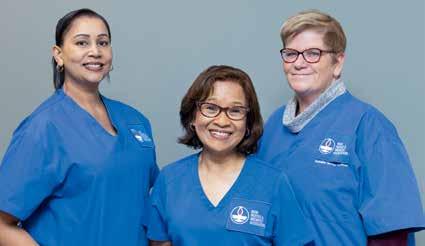
For all membership enquiries and assistance, including The Lamp subscriptions and change of address, contact our Sydney office.
Sydney Office
50 O’Dea Avenue, Waterloo NSW 2017 (all correspondence)
T 8595 1234 (metro) 1300 367 962 (non-metro)
F 9662 1414 E gensec@nswnma.asn.au
W www.nswnma.asn.au
Hunter Office
8–14 Telford Street, Newcastle East NSW 2300
NSWNMA Communications Manager

Danielle Blasutto
T 02 8595 1234 (metro) T 1300 367 962 (regional)
For all editorial enquiries, letters and diary dates
T 8595 1234 E lamp@nswnma.asn.au
50 O’Dea Avenue, Waterloo NSW 2017
Produced by Hester Communications T 0414 550 376
Press Releases
Send your press releases to:
F 9662 1414 E gensec@nswnma.asn.au
Editorial Committee
Shaye Candish, NSWNMA General Secretary
Michael Whaites, NSWNMA Assistant General Secretary
O’Bray Smith, NSWNMA President
Michelle Cashman, Long Jetty Continuing Care
Richard Noort, Justice Health
Liz McCall, Byron Central Hospital
Diane Lang, South East Regional Hospital, Bega Valley
Rachel Hughes, John Hunter Hospital
Karen Hart, Wagga Wagga Base Hospital
Printed by
Printed by IVE Group Sydney
Advertising
Danielle Nicholson T 8595 2139 or 0429 269 750
F 9662 1414 E dnicholson@nswnma.asn.au
Information & Records Management Centre
To find archived articles from The Lamp, or to borrow from the NSWNMA nursing and health collection, contact: Adrian Hayward, Coordinator.
T 8595 2175 E gensec@nswnma.asn.au
The Lamp ISSN: 0047-3936
General Disclaimer
The Lamp is the official magazine of the NSWNMA. Views expressed in articles are contributors’ own and not necessarily those of the NSWNMA. Statements of fact are believed to be true, but no legal responsibility is accepted for them. All material appearing in The Lamp is covered by copyright and may not be reproduced without prior written permission. The NSWNMA takes no responsibility for the advertising appearing herein and it does not necessarily endorse any products advertised.
Authorised by S. Candish, General Secretary, NSW Nurses and Midwives’ Association,
50 O’Dea Avenue Waterloo NSW 2017
Privacy Statement
The NSWNMA collects personal information from members in order to perform our role of representing their industrial and professional interests. We place great emphasis on maintaining and enhancing the privacy and security of your personal information. Personal information is protected under law and can only be released to someone else where the law requires or where you give permission. If you have concerns about your personal information, please contact the NSWNMA office. If you are still not satisfied that your privacy is being maintained, you can contact the Privacy Commission.
Subscriptions for 2023
Free to all Association members. Professional members can subscribe to the magazine at a reduced rate of $30. Individuals
$84, Institutions $140, Overseas $150
COVER STORY
Aged care’s $11.3 billion pay rise
The federal Labor government has funded a 15 per cent pay increase for aged care workers
08 COVER STORY
Record 15% pay rise for 250,000 aged care workers
The federal Labor government has funded a 15 per cent pay increase for aged care workers.
14 PUBLIC HEALTH SYSTEM
“Ambitious” PHS award claim seeks comprehensive workplace reform
The NSWNMA has lodged its claim for 2023 with the NSW Ministry of Health, outlining a comprehensive list of proposed changes to the Public Health System Nurses’ and Midwives’ (state) Award.
16 PUBLIC HEALTH SYSTEM Labor’s election win changes the game on ratios
A change of government in NSW is a victory for political participation by nurses and midwives and creates a new pathway for the implementation of ratios.
20 THE VOICE NSWNMA backs the Voice
The NSWNMA supports a ‘Yes’ vote in the forthcoming referendum to establish an Aboriginal and Torres Strait Islander Voice.
24 THE VOICE Nurse practitioners hamstrung in efforts to close the gap Healthcare in remote Aboriginal communities is hampered by bureaucratic barriers.
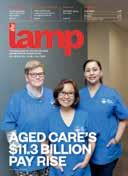
REGULARS
5
6
THE LAMP JUNE / JULY 2023 | 3
JUNE
JULY 2023
VOLUME 80 NO. 3
/
Editorial
Competition
6
Your letters
What’s on
Ask Shaye 36 News in brief
Crossword
Book Club 45 Nursing Research Online and Professional Issues
Your Health & Wellbeing
30
32
41
43
46
74,374 The Lamp is independently audited under the AMAA's CAB Total Distribution Audit. Audit Period: 01/04/2020 31/03/2021 (Yearly Audit) Avg Net Distribution per Issue The Lamp is printed on PEFC certified paper. The paper is certified under the Programme for the Endorsement of Forest Certification (PEFC) which assures consumers that the utilised forestry products can be traced from a certified, sustainably managed forest through all stages of processing and production by a chain of custody process. The Lamp is wrapped in Ecopure film which is recyclable and biodegradable.
COVER : Linda Hardman, Jocelyn Hofman and Angelin Maharaj, Photographed by Sharon Hickey
8
You and a friend will experience:
• 5 nights’ accommodation in a two-bedroom pool villa

• Inclusions valid for up to four guests (NSWNMA will arrange for two return flights only as part of this prize)*
• Return airport transfers

• Daily breakfast served in your villa
• 2 x a la carte lunches and 2 x dinners per stay
Recruit a new member and go into the draw to win a rejuvenating holiday in
Seminyak Bali
PRIZE
Experience the ultimate private pool villa luxury at the award-winning Agata Villas in Seminyak, Bali



Secluded tropical bliss awaits at Agata Villas Seminyak – your own private paradise. Discreetly tucked away from the hustle and bustle of Seminyak yet within easy reach of the beach clubs, restaurants and boutique’s Seminyak is known for.
• 1 x BBQ Seafood dinner at Melati Seafood Restaurant, Jimbaran (up to four guests)
• Daily afternoon tea
• 1 x Full Day Tour per stay (private charter)

• Welcome seasonal fruit basket and drink each guest on arrival

• The NSWNMA will arrange return flights for two to Bali
Recruiters note: Join online at www.nswnma.asn.au Every member you sign up over the year gives you an entry in the draw! If you refer a member to join online, make sure you ask them to put your name and workplace on the online application form, so you will be entered in the draw. Conditions apply. The prize will be drawn on 1 July 2023 and must be redeemed by 30 June 2024. Subject to room availability. Block out dates 24 December 2023 – 3 January 2024. Accommodation package and inclusions (excluding flights) is valid for up to four guests. NSWNMA will arrange and pay for flights for two to Bali. If a redraw is required for an unclaimed prize it must be held up to 3 months from the original draw date.
4 | THE
/
LAMP JUNE
JULY 2023
THE 2022 – 2023 NSWNMA MEMBER RECRUITMENT SCHEME
Prize drawn 1 July 2023
Valued at over $5,000
GENERAL SECRETARY
Aged care pay rise is a massive achievement
It’s a win for the ages, but more work is needed to ensure the money ends up in the pockets of the deserved – our heroic aged care members.
During the pandemic the renowned publication Scientific American described aged care work as “one of the deadliest jobs” to be engaged in. When COVID-19 hit, our aged care facilities were totally unprepared. They lacked personal protective equipment (PPE), adequate infectious disease training, access to frequent testing, and backup staff to cover for sick employees.
In many ways, aged care facilities were the epicentre of COVID-19 in Australia.
The pandemic revealed aged care’s “dirty little secret” to the community – the long-term neglect
“work value” case brought by the Australian Nursing and Midwifery Federation and other health unions. The full bench of the FWC granted a 15 per cent increase for nurses and AiNs on the award.
THE ALBANESE GOVERNMENT STEPS UP

The implementation of this figure required the federal government to step up and accept its responsibility, as the sector is financially underpinned by federal government funding.

The Albanese government has now done so. It allocated $11.3 billion in the budget, to cover the pay increase. Significantly, it has provided sufficient funds so that aged care workers on enterprise agreements earning aboveaward wages can also receive the same increase in dollar terms as those on the award.
EMPLOYERS NEED TO BE ACCOUNTABLE
Although we are very excited the government has prioritised aged care with this remarkable pay rise, we have one lingering concern.
There is no explicit mechanism of accountability built into the funding to ensure that employers pass on the taxpayer-funded pay increase to aged care staff on enterprise agreements. Some employers have committed to do so. We welcome that.
But we also need to be realistic and act accordingly. Wage theft in Australia in recent years has been rife, including in the aged care sector.
of the sector that had left residents and staff vulnerable during a health emergency.
The Royal Commission into Aged Care Quality and Safety did much to shine a light on this shameful situation and to chart a way forward.
One of its main recommendations was that aged care staff should receive a sizeable pay increase as (belated) reward and recognition for their undervalued and underpaid work, and to make the sector more appealing to attract desperately needed staff. This recommendation evolved into a more concrete figure after the Fair Work Commission (FWC) heard a
So far, so good. The royal commission, your union, the FWC and the federal government have acted so that aged care workers can finally be fairly paid for their crucial role in caring for Australia’s elderly.
It is also a brilliant and deserved reward for their tireless campaigning. But there is one party left that must accept its responsibility before the pay rise can be fully implemented: employers.
For our aged care members on the award it is very straightforward – you are entitled to a 15 per cent pay rise from 1 July 2023.
For those on enterprise agreements earning above-award wages it is a bit more complicated, but you are still deserving of the 15 per cent award increase.
Over the last 30 years we’ve seen nursing home operators fail to pass on taxpayer funding intended for workers. With a long history of providers pocketing government funding as profits, we’ll need to hold them to account and ensure every cent ends up with workers.
Let’s be crystal clear: this is your money and you must be paid every cent.
We will continue to pressure the government to introduce stronger measures of accountability tied to the funding but in the meantime, we can shape our own destiny.
Let’s continue to build a strong union presence in the sector, which will give aged care members the power to keep employers honest.
If you know a colleague who isn’t a NSWNMA member yet, encourage them to join up now! n
THE LAMP JUNE / JULY 2023 | 5
EDITORIAL SHAYE
Candish
“Let’s be crystal clear, this is your money and you must be paid every cent.”
Win ONE O ANNA BLATMAN
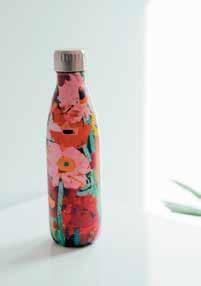
THE PERFECT GIFT FOR SOMEONE SPECIAL Koh Living have created art-inspired gifts that are both meaningful and great value. When you give a loved-one a unique gift from Koh Living you can be sure it will be loved and used for years to come. Discover gifts by established Australian artists.

SPECIAL OFFER
20% OFF all online purchases during June and July
Exclusive to NSWNMA members. Simply enter promo code LAMP at checkout. Shop kohliving.com.au
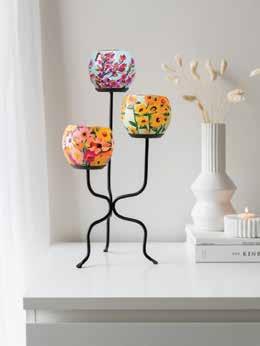
Have your Say
LETTER OF THE MONTH
The Voice - it just makes sense
The Voice, not the singing competition but the Aboriginal and Torres Strait Islander voice to parliament, is something very personal to me.
My name is Roslyn Lockhart and I am firstly a Barkindji woman, but also a nurse and union member.
My mum, a proud Barkindji woman, was also a nurse for more than 45 years and a union member for all of that time. She was also a delegate for her local union. When I joined the profession, she was a strong advocate for union membership. My mum believes in the strength of the collective way of fighting for critical issues, as well as protecting and supporting nurses to ensure they know their rights and responsibilities.
Remember that being Indigenious and able to vote in elections had just become a right around the same time my mum became a nurse and union member. Having a say and a voice was not taken for granted by my Aboriginal mum; it was something she deeply valued and encouraged. Her important message of having a collective say – through the union – is what inspires me to support the Voice.
My understanding is that the Voice is a formal process for Aboriginal and Torres Strait Islander peoples to have a say in government legislation and policies that directly impact us. This means we would have a greater say on the issues that affect us.
The individuals who are core to enacting the Voice to parliament would be elected by Aboriginal and Torres Strait Islander peoples. It would be a voice of the people, for the people representing the First Nation peoples of this land.
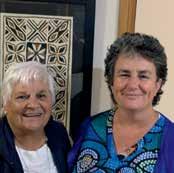
The Lamp has partnered with Koh Living to give NSWNMA members a chance to win one of 3 x Anna Blatman Bundles (RRP $265). .

To enter the competition, simply email your name and membership number with the subject: KOH LIVING to lamp@nswnma.asn.au
How can it ever be wrong for people to have a say in matters that affect them so deeply?
Rosyln Lockhart, RN
If there’s something on your mind, send us a letter and have your say. The letter of the month will WIN a gift card. The letter judged best each month will receive a $50 Coles Group and Myer gift card.
COMPETITION
(RRP $ *Conditions apply. Special Offer valid until midnight 31 July 2023. Competition entries from NSWNMA members only and limited to one entry per member. Competition opens 1 June and closes 31 July 2023. The prize is drawn on 1 August 2023. If a redraw is required for an unclaimed prize it must be held up to 3 months from the original draw date.
YOUR LETTERS
Pictured: Rosyln Lockhart, RN of 23 years, pictured with her mum, Barbara Brown, retired nurse of 45 years
St Vincent’s and the Mater join forces for historic action
As many of you may know, nurses and midwives at the Mater and St Vincent’s Private hospitals are currently in EA negotiations with St Vincent’s Hospital Australia (SVHA). We continue campaigning for safe nurse-to-patient ratios and fair pay. On International Nurses Day, both sites joined forces and stopped work to rally together for the very first time. Together, we renewed calls for SVHA management and CEO Chris Blake to adhere to our EA demands and agree to implement nurse-to-patient ratios and a fair pay rise that is in line with the rising cost of living.
I really want to paint a picture for you of what it is like for our members and for midwives here at the Mater. This is the reality of what midwives have to deal with and the current workloads SVHA management expects us to continue to put up with:
• On a day shift, a midwife is looking after six mums, six babies, six partners. A total of 18 people.
• On a night shift the ratio is seven mums, seven babies, seven partners. That’s 21 people to account for.
At the Mater, the acuity of the mothers we care for has increased exponentially, even prior to COVID-19.
For the mums in our care, we are seeing increasing cases of anxiety and depression. These are very real issues that all have to be dealt with in addition to providing obstetric care.
Our caesarean rate is very high, leading midwives to now look after surgical patients, many of whom
have post-operative complications. This is all on top our workload of six to seven mothers and their babies. Skill mix is an increasing issue for our team as we struggle to retain experienced staff. Our peers are burning out due to the workloads and many are reducing their hours as a consequence. Management’s response is to employ new grad nurses; however, this adds a layer of complexity given the need for closer supervision in the early stage of their career.
Team leaders are regularly having to take care of patients, ward assistant shifts are cancelled or not replaced when they are sick, and the list of non-nursing duties continues to grow as we face being stretched to breaking point.
The current workload is unsustainable. We are now in a crisis, and we are desperate for SVHA management to come to the table and negotiate to see staff-topatient ratios delivered.
I know the challenges we experience here at the Mater are not isolated and the unstainable workloads, poor skill mix, lack of breaks and loss of experienced staff are all issues being felt by my colleagues over at St Vincent’s Private. That is why our show of solidarity on International Nurses Day was so important.
We urgently need to reform, to ensure we can care for our patients and look after each other at the same time. All we want to do is provide the high-quality care we were trained to do and have the appropriate conditions that enable us to do this safely. Why is SVHA not letting us do our job properly?
SVHA, it is time to come to the table and meet our fair requests before it is too late.
Deirdre Duggan, RN RM
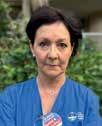
The future for nurses and midwives is on the up
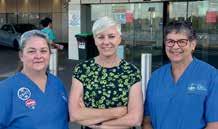
Since the state election on 25 March, the morale in public nursing and midwifery has improved dramatically. There is a unique sense of hope and excitement for the future – one that was long overdue. This optimism was most evident at our branch meeting, where the 2023 Log of Claims was endorsed. It was attended by more members than any other branch meeting since the Stop Work gathering last year, and our members were positive and confident we will finally see real change.
The 10 per cent pay rise request and 100 per cent salary packaging claims are just the tip of the iceberg. With claims for ratios in so many areas of public health, we can see the difference these moves will make to the working lives of our members. There is a reality before us that these changes are going to begin with the five areas already agreed to by NSW Labor.
We are seeing members who most likely would have never attended a branch meeting before now coming along. These people want to write resolutions and fight for their own areas that are not yet covered by Labor’s pledges or the Log of Claims. These members can now see that we CAN make a change, and the best way to do that is by getting involved and fighting for it!
The future for nurses and midwives is on the up, and we have real hope that meaningful change is not far away.
Rachel Hughes, EEN
THE LAMP JUNE / JULY 2023 | 7 SEND YOUR LETTERS TO: Editorial Enquiries EMAIL lamp@nswnma.asn.au fax 9662 1414 MAIL 50 O’Dea Avenue, Waterloo NSW 2017. Please include a high-resolution photo along with your name, address, phone and membership number. Letters may be edited for clarity and space. Anonymous letters will not be published.
Record 15% pay rise for 250,000 aged care workers
The federal Labor government has funded a 15 per cent pay increase for aged care workers.
Wages in the underpaid and undervalued sector will now be brought in line with the Public Health Service and private hospitals.
Years of tireless campaigning by the NSWNMA and other unions has paid off, with the federal government allocating $11.3 billion for a record 15 per cent pay increase for aged care workers.
The government says the $11.3 billion will be paid to aged care providers to cover a 15 per cent increase to award rates over four years starting from 1 July 2023.
More than 250,000 workers will benefit, the government says.
The increase goes to registered nurses (RNs), enrolled nurses (ENs), assistants in nursing (AiNs), personal care workers (PCWs), head chefs, cooks, recreational activities officers, and home care workers.
An RN on a level 2.3 award wage will get an additional $196.08 a week –more than $10,000 a year.
An AiN on a level 3 award wage will receive an additional $136.68 a week – more than $7100 a year.
The Fair Work Commission ordered a 15 per cent increase to award rates of pay.
PAY RISE IS FOR THOSE ON EAs TOO
The government allocated $11.3 billion so that providers can pay this increase to workers on minimum award rates as well as those on enterprise agreements (EAs) who get above-award rates of pay.
Minister for Aged Care, Anika Wells, said, “There are plenty of providers out there who have already pledged to pass on the full amount to workers, whether they are on the award or above on the EA. And I absolutely welcome that.”
NSW Nurses and Midwives’ Association General Secretary, Shaye Candish, said the union is pushing the government to introduce stronger accountability measures to ensure providers pass on the funding in full via an increase to both award and EA rates of pay.

“We are excited that the government is investing in the aged care workforce in a really meaningful way,” she said during an online briefing to aged care members.
“However, we need better mech-
anisms to make sure the money flows through to workers.
“We campaigned very strongly on transparency and accountability in the lead-up to the last federal election because we know providers don’t always pass on additional funding.
“We will be lobbying really heavily for the government to implement much stronger accountability measures so that taxpayer dollars are flowing to the places that they’re supposed to go – and that is into workers’ pockets.”
NSWNMA WILL FIGHT FOR THE FULL INCREASE
Shaye said the NSWNMA will create a tool to show members what rate of pay they should receive after the 15 per cent increase.
“We encourage all aged care workers to join the NSWNMA so that we can help you to achieve that.”
Shaye said the pay increase is the result of “many years of lobbying and campaigning from unions like ours”.
“Many of our members have been campaigning for a long time – talking about the issues, talking about the
COVER STORY 8 | THE LAMP JUNE / JULY 2023
We are excited that the government is investing in the aged care workforce in a really meaningful way. However, we need better mechanisms to make sure the money flows through to workers.’
— NSWNMA General Secretary, Shaye Candish
work they do, and explaining to the community how important it is that we pay aged care workers what they deserve,” she said. These efforts helped bring about the aged care royal commission and Fair Work Commission work value case that ‘recognised the historical undervaluing of nurses and assistants in nursing in the aged care sector.”
They also pushed the federal Labor government to commit to landmark reforms for residential aged care, such as mandatory minimum hours of care, requiring RNs to be employed 24/7, and better nutrition standards. n

Minister for Aged Care, Anika Wells, was asked at a press conference how the government would ensure that providers passed the pay increase on to all aged care workers – including those on EAs with above-award pay rates.
Ms Wells said the government was working with providers and unions to create a schedule “so that any aged care worker in this country will be able to look up

what they should be getting by way of pay rise and to make sure they do get it in discussion with their employer and with their union.”
“As of 1 January next year, we will also be publishing what providers are paying their workers and they will have to attest to us in quarterly financial reports that they have passed on that full rate.”n
COVER STORY THE LAMP JUNE / JULY 2023 | 9
‘There are plenty of providers out there who have already pledged to pass on the full amount to workers, whether they are on the award or above on the EA. And I absolutely welcome that.’
— Minister for Aged Care, Anika Wells
‘We will publish wage rates’
LONG MARCH TO AGED CARE REFORM
— Minister for Aged Care, Anika Wells
Aged care wage increase –what it means for you
The 15 per cent ‘work value’ increase to aged care award rates should also be paid in full to workers on higher enterprise agreement (EA) rates. The government has allocated $11.3 billion for this purpose
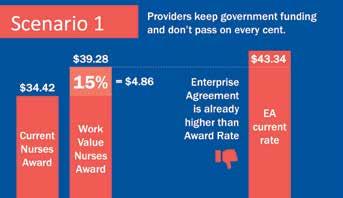
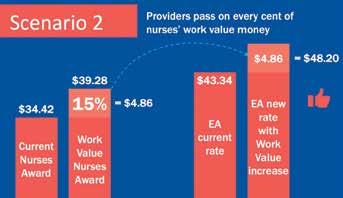
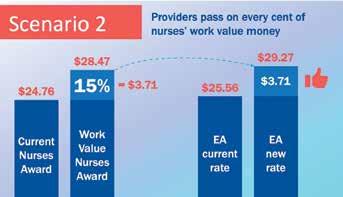
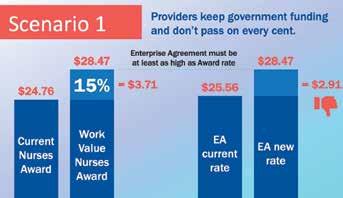
but some employers may try to keep all or part of the increase.
Charts on this page show how much money is at stake. We use wage rates paid to a Certificate 3 AIN and a RN at Opal Specialist Aged Care as examples typical of the aged care industry.
COVER STORY 10 | THE LAMP JUNE / JULY 2023
In the above hypothetical example, the employer absorbs part of the $3.71 per hour award increase. This reduces the EA hourly increase to just $2.91.
In the above hypothetical example, the employer passes on the full $3.71 per hour award increase.
In the above hypothetical example, the employer pockets the entire award hourly increase of $4.86 because the existing EA rate is already higher than the new ‘work value’ award rate.
In the above hypothetical example, the employer passes on the entire hourly award increase of $4.86, which lifts the EA hourly rate to $48.20.
Certificate III AiN Scenario 1
Certificate III AiN Scenario 2
Registered Nurse Scenario 2
Registered Nurse Scenario 1
–
PAY RISE IS A GREAT INCENTIVE
NSW aged care RN Emily Hartney says the 15 per cent increase to award pay rates is “long overdue and much needed”.
Emily points out that aged care nurses went “above and beyond’ throughout several waves of COVID19, working long hours to keep the elderly safe.


“They worked during uncertain times, particularly when we knew little about the virus and the workforce was already suffering under increasing labour shortages,” she says.
Getting your money
– next steps
1. The NSWNMA is releasing a ‘Pay Checker’ tool. This will show whether you are getting the full wage increase. Complete the tool and encourage your colleagues to do the same.
2. If your employer tells you how they intend to pay the increase, pass the information on to the NSWNMA. We need to know what your employer is proposing so we can help you get the full amount.
3. If your employer refuses to pay the full increase, we can help you fight for it. If you would like to get involved in securing wage justice for yourself and your colleagues, or just learn more about the union, contact the NSWNMA.
4. Encourage people you work with to join the NSWNMA. Remind them that without the union, there would be no wage increase. n
She adds, “The industry desperately needs more nurses and aged care workers to keep facilities open and functioning. It must be a priority that older Australians receive high quality care in their later years.
“This pay rise is a great incentive to encourage more nurses to come to the aged care industry and have a fulfilling career.
“This funding announcement also serves as a great boost for all the current staff working in the industry, encouraging them to remain in the sector and continue working to provide the high-quality care we so proudly strive for.”
COVER STORY THE LAMP JUNE / JULY 2023 | 11
The 15 per cent ‘work value’ increase to aged care award rates should also be paid in full to workers on higher enterprise agreement rates.
n
“This pay rise is a great incentive to encourage more nurses to come to the aged care industry and have a fulfilling career.”
— Emily Hartney, RN
EMILY HARTNEY, RN
Aged care work ‘recognised and valued at last’
RN Jocelyn Hoffman has worked in aged care for 36 years and played a prominent part in the NSWNMA’s campaign for aged care reform.
Jocelyn has lobbied numerous politicians and spoken at many meetings in support of better staffing and working conditions in nursing homes.

In 2018, she spoke at a Sydney rally to launch the NSWNMA campaign for guaranteed staff-to-resident ratios in aged care.
She told the rally that aged care had become a commodity traded on the share market since the Howard government deregulated the sector with the Aged Care Act 1997.
“This loosely worded legislation has led to most nursing homes being dangerously understaffed. Yet alarmingly, they manage to pass accreditation checks,” she said.
“Our vulnerable elderly residents have been put at the mercy of whatever level of care companies will provide.
“How many more heartbreaking scandals do we have to endure before our government will act on the staffing crisis?” she asked.
Last month, Jocelyn said she was excited that aged care workers “are finally being recognised and valued”.
“Thank you to our NSWNMA and our ANMF. We are going in leaps and bounds now compared to the past,” she said during an online briefing for NSWNMA members in the sector. She urged aged care workers to join the union because “we cannot trust
providers to do the right thing. It is only through our collective power that we can hold providers to account.”
“This is a very historic moment and we cannot allow government money allocated for this pay increase to go back to the providers, to buy their chandeliers and their pianos and their expensive cars.
“This money belongs to us. We worked so hard for it; we risked our lives through the pandemic.
“The community is behind us but you can’t do this on your own – you really need to join the union.” n
COVER STORY 12 | THE LAMP JUNE / JULY 2023
“This is a very historic moment”
‘It is only through our collective power that we can hold providers to account.’
—Jocelyn Hoffman, RN
Employers must be accountable for taxpayer’s money
Assistant in nursing Susan Walton has worked in an NSW nursing home for 19 years and is a veteran of the NSWNMA’s long campaign for a better deal for aged care residents and workers.
She has lobbied federal politicians in Canberra and state MPs in Sydney, given TV interviews, and
New route for aged care migrants
The federal Labor government has introduced a new pathway for aged care employers to sponsor foreign workers as skilled migrants.
Employers can now sponsor direct care workers on skilled visas through a new Aged Care Industry Labour Agreement instead of having to negotiate companyspecific labour agreements for each individual provider.
campaigned for aged care reform during state and federal elections.

In an online briefing to NSWNMA members, General Secretary Shaye Candish introduced Susan as one of the members who gave evidence to the aged care royal commission in 2019 about what it was like to work in a chronically understaffed nursing home.
“Sue did a tremendous job and really spoke about the experiences of working in aged care,” Shaye said, before inviting her to speak to members.
Susan said the commissioners “were kind enough to listen to us explain what was happening in our facilities
and what we had seen. We were very grateful to speak about this and make Australians realise that we’ve been the forgotten people.”
Susan said she and her co-workers were very excited to hear that over 250,000 aged care workers were finally being recognised by being awarded a 15 per cent increase –“especially because we all work extremely hard and we’ve been forgotten for a long time.”
“RNs are in charge of so many patients and have so much responsibility.
“It is the same with us AiNs. In our case we do five people’s jobs; we don’t have cooks, cleaners, laundry staff or kitchen staff, and we also give out medication plus try to care for the elderly – it doesn’t work. “Then it dawned on us that as we are on EAs, once again there will be no accountability and transparency for the 15 per cent pay increase (once the government pays it to the provider).”
Unless the government mandates that the money must go to workers, “we can’t really say we’re excited that we’re going to get this lifechanging money”.
Susan encouraged aged care workers to join the NSWNMA. “I can guarantee you, over the many years that we’ve been campaigning I would not have been able to do it without my union being there to support me,” she said. n
The Aged Care Industry Labour Agreement entitles the sponsor to bring in overseas care workers for a period of up to four years on a temporary basis, or for permanent residence after two years of employment.
The sponsor will need to enter into a memorandum of understanding with an aged care union to access the labour agreement.
Immigration Minister Andrew Giles said this approach would help to address workforce shortages “while also protecting workers and promoting good jobs”.
“In recognition of the increased vulnerability of temporary migrants, newly sponsored care workers will have an opportunity to speak to their union shortly after commencing, should they wish to do so,” he added.
The three occupations listed under the Aged Care Industry Labour Agreement are nursing support worker, personal care assistant, and aged or disabled care carer. n
COVER STORY THE LAMP JUNE / JULY 2023 | 13
‘We all work extremely hard and we’ve been forgotten for a long time.’
— Susan Walton
‘Ambitious’ PHS award claim seeks comprehensive workplace reform
The NSWNMA has lodged its claim for 2023 with the NSW Ministry of Health, outlining a comprehensive list of proposed changes to the Public Health System Nurses’ and Midwives’ (State) Award.
SWNMA General Secretary, Shaye Candish, said this year’s claim was unanimously endorsed by the union’s public sector branches, and was deliberately ambitious to secure workplace reforms, as well as to attract and retain skilled nurses and midwives in public health. The claim also seeks a 10 per cent increase in pay and wage-related allowances plus superannuation effective from 1 July 2023.
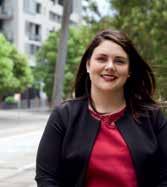
Shaye said nurses and midwives in the public health system had seen “little to no improvements to their working conditions for the past decade”.
“Our members have campaigned for nurse-to-patient ratios for a long time. They shouldered the brunt of the pandemic for three long years, and they’ve gone to extraordinary lengths to deliver patient-centred care, often to the detriment of their own health and wellbeing,” she said.
“We have a comprehensive claim this year detailing evidence-based improvements to staffing across a range of specialty areas, which would increase workforce wellbeing and provide better support for professional development.”
NSWNMA Assistant General Secretary, Michael Whaites,
a
of
said the establishment of a Safe Staffing Levels Taskforce (see box) with NSWNMA representatives “would ensure the outdated ‘Nursing Hours Per Patient Day’ system converts to a minimum and enforceable safe staffing model within the award”.
“We are focused on continuing the fight for safe staffing ratios, relief from cost-of-living pressures, and decent wages that adequately reflect the work of skilled professionals,” Michael said.
“Our 2023 claim aims to ensure public sector nurses and midwives can deliver high-quality care to all patients, regardless of where they live in NSW, and we will continue advocating on behalf of our members for as long as it takes.” n
14 | THE LAMP JUNE / JULY 2023
N“We have a comprehensive claim this year detailing evidence-based improvements to staffing across
range
specialty areas, which would increase workforce wellbeing and provide better support for professional development.”
PUBLIC HEALTH SYSTEM
— NSWNMA General Secretary, Shaye Candish
Key features of the claim
• Ratios applied shift by shift – based on the actual number of patients in each unit
• ‘Specials’ in addition to ratios or rostered staffing minimums
• In charge of shift in addition to minimum ratios and without a patient load
• AiNs and AiMs in addition to minimum ratios. Plus a 10 per cent increase in pay and wage related allowances plus superannuation effective from 1 July 2023.
Download a snapshot of the claim or view the entire claim at:
https://www.nswnma.asn.au/ public-health-system-award-claim-2023/
NSWNMA takes Ministry to NSW Supreme Court over NHPPD breaches

The NSWNMA has begun proceedings in the NSW Supreme Court against the Ministry of Heath over 1400 alleged breaches of the NHPPD provisions of the PHS Nurses and Midwives’ State Award.
These 1400 alleged breaches are only a fraction of the total identified from data obtained from the Ministry of Health in February 2023.
A large part of the alleged contraventions are related to Central Coast Local Health District, by far the worst district in terms of non-compliance, according to the data.
The matter is listed for directions on 7 June.n
Safe Staffing Levels Taskforce to drive implementation of ratios
The NSW Government has established a Safe Staffing Levels Taskforce as a “historic step” towards implementing nurse-to-patient ratios in NSW public hospitals.
The working group will see NSWNMA representatives working alongside NSW Health officials to plan the rollout of a shift-by-shift staffing model for nurses and midwives, starting with Emergency Departments.
NSWNMA Assistant General Secretary Michael Whaites , said the Taskforce will pave the way for the significant reforms urgently needed to repair the broken staffing system.
“We welcome the opportunity to work collaboratively with the NSW Government to undertake this important reform,” Michael said.
“This Taskforce will lay the groundwork for the ratios we’ve campaigned for over many years. We’re eager to work through the staffing requirements and how this phased approach will be implemented.”
The Taskforce had its first meeting on 19 May.
The government has also set up a Surgical Care Taskforce to “improve the delivery of surgical services and reduce the state’s elective surgery waiting list”, according to NSW Health.
The NSWNMA will be represented in the Surgical Care Taskforce by councillor Kerry Rodgers.n
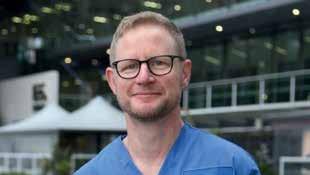
THE LAMP JUNE / JULY 2023 | 15 PUBLIC HEALTH SYSTEM
MICHAEL WHAITES , NSWNMA ASSISTANT SECRETARY
Labor’s election win changes the game on ratios
An opportunity for change
Geoff Hudson, branch president at Albury Hospital, said from his personal perspective, the NSW election result was great.

“My partner [Dr Amanda Cohn] was elected to the Upper House, and is now the Greens spokesperson for Health. She has moved a notice of motion about reinforcing support for our ratios campaign.”
Geoff said Albury branch members were active during the election campaign, with street stalls and letterboxing with flyers for ratios.
“Nurses are very happy with the change of government,” he said.
Geoff said, following the election, his colleagues “are certainly hopeful but we are really just watching, waiting to see”.
“People think there is an opportunity for change to happen now.”
He said the Albury branch voted unanimously for the 2023 claim.
“Certainly, workloads and ratios are the biggest issues,” he said.
“We are in a bit of a unique position in Albury, on the border with the Victorian side a couple of kilometres
away. We see a real disparity because they have ratios in Victoria and because they haven’t had the same pay cap that we’ve been subject to.”
Geoff said the branch will continue to engage with the community about our issues.
“Our next step as a branch is to try to get some local media to get ratios back on the agenda. And we want to make sure that all our members are aware of the new claim and what we are asking for.
“My biggest concern going forward is the lack of timeframe around the government making changes. The government has said they will implement ratios – although not the full claim we have asked for –but they have not put a timeframe around that.” n
16 | THE LAMP JUNE / JULY 2023 PUBLIC HEALTH SYSTEM
“Our next step as a branch is to try to get some local media to get ratios back on the agenda.”
A change of government in NSW is a victory for political participation by nurses and midwives and creates a new pathway for the implementation of ratios. The Lamp talked to NSWNMA members in the public health system about the election result and the consequences for public health in NSW.
GEOFF HUDSON, BRANCH PRESIDENT
–ALBURY HOSPITAL
Alicia Rodgers, the branch secretary at Nepean Hospital is an RN in the Neonatal Intensive Care Unit (NICU). She said the election is a step forward in our campaign but we need to maintain pressure or “we won’t be able to make change”.
“I think it is really positive that members across NSW have voted in support of our 2023 claim,” she said.
Excited but apprehensive
Samantha Gregory-Jones, NSWNMA branch delegate for the Canowindra Health Service, said her colleagues are expecting a change of government to lead to concrete improvements in their health service.
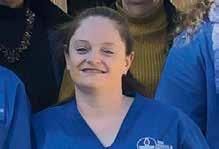
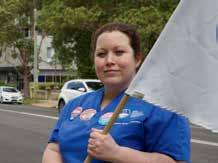
“We are a rural facility – a fifteenbed facility staffed to run ten with ambulatory care and an ED – and we work with a base of one RN and one EN.
“For us [if the ALP delivers on its promise] it would mean having two RNs on a shift, and a third person all the time.”
Samantha said there was a mixture of feelings after the election.
“We were excited, but we were apprehensive at the same time. [The result] was kind of like we had a bit of a sigh of relief. Initially, my members were saying ‘It means another RN, and it means we
“I’m cautiously optimistic, but I think there is a lot of work before we get any meaningful change in NICU and Special Care Nurseries.”
“My colleagues in Neonatal Intensive Care Unit (NICU) were subdued after the election. We are, unfortunately, one of the units that didn’t get a commitment from the incoming government to improve nurse to patient ratios.”
She said NICU nurses are asking for ratios of one-to-one in neonatal intensive care, one-to-two in highdependency units, and one-to-three in a special care nursery unit.
“Critically, we are also asking for access nurses, which some of our adult ICUs have. We are also asking for things like lactation consultants. They are currently not available in all NICUs to support mothers to express milk for their sick or preterm baby.”
Alicia said a group of NICU nurses were able to engage with the new Minister of Health, Ryan Park, at the strike rally outside Parliament House last November.
“We spoke to him about ratios in NICU, and we really impressed on him why ratios are important.
“He told us he was listening, and we really hope he was listening and will have some discussions with his colleagues.
“We would welcome the Health Minister to come and meet with neonatal nurses to get an idea about what happens in NICU and Special Care Nurseries.
“All people in NSW deserve safe care from their nurses and their midwives; NSW should be leading our country in terms of health care, not trailing behind. n
are not working in isolation’.”
Samantha said that even though Canowindra is a small service, NSWNMA members were willing participants in the campaign leading up to the election – as was the local community.
“We did participate in the very first strike in 2022. We had all our members involved – about ten of us, and three of us were on shift.
“The community members who came said ‘We’re here because you literally saved our lives, and we are so thankful’.
“For the second strike, we all wore red shirts. On our shifts, we didn’t do anything that wasn’t about saving lives or directly impacting the patients: so, we didn’t make beds, we didn’t do the midnight timesheets.”
Samantha said there was strong support for the NSWNMA’s 2023 claim – inside and outside the hospital.
“We had a one hundred-percent-unanimous yes vote. Ratios are so important.
“Our local member, [Independent] Philip Donato, has popped out a couple of times and had a photo taken with us, and is very supportive. That is one motivation to see there is light. And we do feel as if our metropolitan colleagues are lifting us up.” n
THE LAMP JUNE / JULY 2023 | 17
“I’m cautiously optimistic”
“We would welcome the health minister to come and meet with us in NICU and special care nursing to get an idea of what happens.”
PUBLIC HEALTH SYSTEM
ALICIA RODGERS, BRANCH SECRETARY –NEPEAN HOSPITAL
SAMANTHA GREGORY-JONES, NSWNMA BRANCH DELEGATE
“We do feel as if our metropolitan colleagues are lifting us up.”
Health and aged care workforces big winners in federal budget
Aged care wasn’t the only winner in the budget. There were also plenty of initiatives to improve the public health system.
There was a strong commitment in the federal budget to support health and aged care workers, with a significant aged care pay rise and nurse practitioner reform among the highlights.
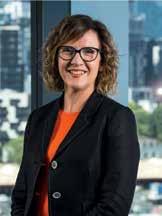
The Albanese government’s review of the scope of practice of healthcare professionals, including nurses and midwives, will offer a pathway for better access to health care across the community, according to the Australian Nursing and Midwifery Federation (ANMF).
The review is part of a $6.1 billion funding package to strengthen Medicare.
ANMF Federal Secretary, Annie Butler, said the removal of red tape that prevents highly skilled nurse practitioners (NPs) and eligible midwives from providing patients with timely access to needed health services, and the 30 per cent increase in Medicare rebates for NP care, will empower them to do what they’re qualified and trained to do, without the need for ‘collaborative arrangements’ with doctors.
There is also a new scholarship program to support registered nurses to train to become NPs.
“The ANMF and our members believe this is a positive first step in putting nurses and midwives at the centre of genuine Medicare reforms and playing a key role in multidisciplinary models of care across the community,” Annie said.
The budget also contained $445 million in funding for a Workforce Incentive Payment, which would encourage eligible general practices to employ more nurses, NPs and midwives,
The ANMF also welcomed:
• $4.2 million for an additional 6000 practice nursing placements
• $1 million to attract 500 previously enrolled and registered nurses to return to the workforce
• changes to scholarships to focus on nursing, midwifery and First Nations health workers.
STRATEGIC PLAN TO BOLSTER NURSE PRACTITIONERS
After the budget the federal government announced a Nurse Practitioner Workforce Plan, which aims to expand the services of highly
trained nurse practitioners (NPs), as a way of addressing increasing demands for health and aged care, and chronic workforce shortages across the country.
Annie Butler said the plan outlined a series of strategic actions that would bolster the NP workforce and underpin the community’s access to quality, primary healthcare services. “The plan recognises the true value of NPs and how they can provide tangible solutions to the many challenges across the health and aged care sectors, which are impacting the delivery of timely, safe health care, particularly in rural and remote communities where there is limited access to a GP, or no GP at all,” she said. n
18 | THE LAMP JUNE / JULY 2023
“This is a positive first step in putting nurses and midwives at the centre of genuine Medicare reforms and playing a key role in multidisciplinary models of care across the community.”
FEDERAL BUDGET
— ANMF Federal Secretary, Annie Butler
New South Wales Nurses and Midwives’ Association Summary of Financial Information for the Year Ended 31 December 2022
The financial statements of the New South Wales Nurses and Midwives’ Association have been audited in accordance with the provisions of the Industrial Relations Act 1991, and the following summary is provided for members in accordance with Section 517(2) of the Act, as applied by section 282(3) of the Industrial Relations Act, 1996.
A copy of the Financial Statements, including the independent Audit Report, will be supplied free of charge to members upon request. Certificates required to be given under the Act by the Accounting Officer and the Committee of Management (“Council”) have been completed in accordance with the provisions of the Act and contain no qualifications.
SUMMARY STATEMENT OF PROFIT OR LOSS AND OTHER COMPREHENSIVE INCOME FOR THE
ENDED 31 DECEMBER 2022
INFORMATION TO BE PROVIDED TO MEMBERS OR REGISTRAR
In accordance with the requirements of the Industrial Relations Act, 1991 [NSW] the attention of members is drawn to the provisions of Sub-Sections (1) and (2) of Section 512 which read as follows:
(1) A member of an organisation, or the Industrial Registrar, may apply to the organisation for specified information prescribed by the regulations in relation to the organisation.
(2) An organisation must, on the making of such an application, make the specified information available to the member or the Industrial Registrar in the manner, and within the time, prescribed by the regulations.
REPORT OF THE INDEPENDENT AUDITOR ON THE SUMMARY FINANCIAL STATEMENTS TO THE MEMBERS
OF THE NEW SOUTH
WALES NURSES AND MIDWIVES’ ASSOCIATION Opinion
The summary financial statements, which comprise the summary balance sheet as at 31 December 2022 and the summary statement of profit or loss and other comprehensive income for the year then ended are derived from the audited financial report of New South Wales Nurses and Midwives’ Association for the year ended 31 December 2022. In our opinion, the accompanying summary financial statements are a fair summary of the audited financial report.
Summary Financial Statements
The summary financial statements do not contain all the disclosures required by section 510 of the Industrial Relations Act 1991 [NSW] or Australian Accounting Standards. Reading the summary financial statements and the auditor’s report thereon, therefore, is not a substitute for reading the audited financial report and the auditor’s report thereon.
The Audited Financial Report and Our Report Thereon
We expressed an unmodified audit opinion on the audited financial report in our report dated 4 April 2023. Our Independent Auditor’s Report to the members on the Financial Report did not contain any particulars of any deficiency, failure or shortcoming as referred to in the Industrial Relations Act, 1991 [NSW], as applied by section 282(3) of the Industrial Relations Act, 1996
Council’s Responsibility for the Summary Financial Statements
The Council is responsible for the preparation of the summary financial statements.
Auditor’s Responsibility
Our responsibility is to express an opinion on whether the summary financial statements are a fair summary of the audited financial report based on our procedures, which were conducted in accordance with Auditing Standard ASA 810 Engagements to Report on Summary Financial Statements.
Daley Audit
Michael Mundt Partner

4 April 2023, Wollongong
Liability limited by a Scheme approved under Professional Standards Legislation
A copy of the Financial Report, including the Independent Audit Report, is available to members on the Member Central portal accessed via www. nswnma.asn.au. Members can obtain a hard copy by emailing the General Secretary, NSWNMA at gensec@ nswnma.asn.au or calling 1300 367 962

YEAR
2022 ($) 2021 ($) Membership revenue 49,064,503 47,419,540 NursePower fund subscriptions 1,001,324 967,753 Other income 724,951 3,262,791 Total income 50,790,778 51,650,084 Less total expenditure (52,502,144) (46,794,849) Result for the year (1,711,366) 4,855,235 Remeasurement of retirement benefit obligations 44,953 29,315 Total comprehensive income attributable to members (1,666,413) 4,884,550 SUMMARY BALANCE SHEET AS AT 31 DECEMBER 2022 Total equity 51,666,065 53,422,384 Represented by: Current assets 15,254,707 15,920,466 Non-current assets 43,986,834 45,450,997 Total assets 59,241,541 61,371,463 Current liabilities 7,355,155 7,659,497 Non-current liabilities 220,321 289,582 Total liabilities 7,575,476 7,949,079 Net assets 51,666,065 53,422,384
THE LAMP JUNE / JULY 2023 | 19
NSWNMA backs the Voice
The NSWNMA supports a ‘Yes’ vote in the forthcoming referendum to establish an Aboriginal and Torres Strait Islander Voice.
In 2023, Australians will be asked whether they support a change to the Constitution to establish an Aboriginal and Torres Strait Islander Voice.
The Voice will advise parliament and government on laws and policies affecting Indigenous people.

The Association supports a ‘Yes’ vote to give Aboriginal and Torres Strait Islander people a say in matters that affect their lives and communities.
This will contribute to better health outcomes, the NSWNMA believes.
The NSWNMA Committee of Delegates resolved in 2018 to support the Uluru Statement from the Heart, which called for constitutional recognition.
The Committee of Delegates resolution said that as a health union, the NSWNMA “has a special responsibility to support measures that contribute to improved health outcomes and progress reconciliation with Australia’s First Peoples.”
It added, “The NSWNMA reaffirms its commitment to closing the gap in health and life expectancy between Aboriginal and Torres Strait Islander people and other Australians.
“We recognise that this will require a multifaceted approach and that selfdetermination for Aboriginal and Torres Strait Islander people must be fundamental.
“Therefore, this Committee of Delegates supports implementation of the Uluru Statement from the Heart as another step forward on the path to reconciliation.”
NSWNMA General Secretary, Shaye Candish, said, “We believe Australia’s original custodians deserve greater representation at the highest level, particularly when it comes to the decision-making processes that impact Aboriginal and Torres Strait Islander communities.”
“Advice, experience and wisdom from Aboriginal communities leads to better policy outcomes. People on the ground know their issues best and having a Voice will deliver practical change.”
REFERENDUM IS A SIMPLE CHANGE TO THE CONSTITUTION
The referendum is about making a simple change to the Constitution. Parliament will decide on the model of the Voice and other details after the referendum.
Members of the Voice will be chosen
by Aboriginal and Torres Strait Islander communities, not appointed by the government.
Members will serve on the Voice for a fixed period, to strengthen accountability to their communities. The proposed addition to the Constitution reads:
“In recognition of Aboriginal and Torres Strait Islander Peoples as the First Peoples of Australia: There shall be a body, to be called the Aboriginal and Torres Strait Islander Voice.
The Aboriginal and Torres Strait Islander Voice may make representations to Parliament and the Executive Government on matters relating to Aboriginal and Torres Strait Islander Peoples.
The Parliament shall, subject to the Constitution, have power to make laws with respect to the composition, functions, powers and procedures of the Aboriginal and Torres Strait Islander Voice.” n
20 | THE LAMP JUNE / JULY 2023 THE VOICE
‘Advice, experience and wisdom from Aboriginal communities leads to better policy outcomes.’
— Shaye Candish
Voice will help close the gap
The Public Health Association of Australia (PHAA) says a constitutionally enshrined Voice to Parliament will “provide a path for Aboriginal and Torres Strait Islander voices to be heard and respected, after being ignored or sidelined for many years”.
“A fundamental building block for addressing Aboriginal and Torres
A Voice for Aboriginal and Torres Strait Islanders within the NSWNMA
The Association proposes creating a path towards increasing voice, representation and leadership of Aboriginal and Torres Strait Islander nurses and midwives within the union.
The NSWNMA Council supports two member-driven initiatives:
• formation of a statewide Aboriginal and Torres Strait Islander NSWNMA Branch and
• creating two dedicated Aboriginal and Torres Strait Islander positions on NSWNMA Council, one each for a nurse and a midwife.
Both proposals will be put to NSWNMA Annual Conference in August this year. n
Strait Islander health challenges is addressing equity,” said PHAA President, Adjunct Professor Tarun Weeramanthri AM.
‘Nothing about us without us’
The Australian Stroke Alliance says a Voice to Parliament will help Indigenous voices to be heard in the design and delivery of health care.
Associate Professor Luke Burchill, from the Alliance’s Aboriginal and Torres Strait Islander Leadership Council, says inability to access culturally safe healthcare services is a major problem.
“Unfortunately, not feeling safe is a major reason why Aboriginal
people are more likely to present late and sometimes critically unwell – and we see much higher rates of death and disability for First Nation peoples in Australia,” said Burchill, who is Australia’s first Indigenous cardiologist. He told ABC NewsRadio, “We need to be seen, we need to be heard. And when it comes to the framing of data about us, we would come back to the thing that we’ve been saying for decades –nothing about us without us.”
Aboriginal and Torres Strait Islander peoples have a stroke incidence rate 2–3 times that of non-Indigenous Australians. Those under 55 have a rate 6–9 times greater. n
Get involved
Follow this link to learn more about the Yes campaign and to get involved:
https://yes23.com.au
THE LAMP JUNE / JULY 2023 | 21 THE VOICE
‘Not feeling safe is a major reason why Aboriginal people are more likely to present late and sometimes critically unwell.’
— Luke Burchill, Australian Stroke Alliance
“We cannot close the most glaring health equity gap in Australia if we continue to ignore its roots in our society.” n
‘We cannot close the most glaring health equity gap in Australia if we continue to ignore its roots in our society.’
— Tarun Weeramanthri AM, Public Health Association
Battling disease in a deprived outback town
An Aboriginal Community Controlled Health Service is getting results in one of Australia’s sickest communities.
There can’t be many Australian communities in worse health than the people of Doomadgee in far north-west Queensland.
Malnutrition and diabetes are common in this remote Aboriginal town, 630 kilometres by road from Mt Isa.
Also rife is rheumatic heart disease –an easily preventable, rare condition in most rich countries.
“The health statistics in Doomadgee are some of the worst in the world –on a par with sub-Saharan Africa,” says Lesley Salem AM, Australia’s first Aboriginal nurse practitioner and an NSWNMA member.
Doomadgee was once a church mission, where girls and boys –members of the Stolen Generation – were raised to work for white landowners on cattle stations.
Only about one third of the population of 1400 has access to a fridge, let alone a phone or computer.
Life expectancy is 55, compared to 83 for the general population.
However, health indicators are improving thanks to an Aboriginal Community Controlled Health Service called Gidgee Healing.
Gidgee provides “holistic and culturally appropriate” health services for Aboriginal people in the Mount Isa, Northwest and Lower Gulf regions of Queensland.
Gidgee hired Lesley to help set up the service in Doomadgee almost six years ago. She’s still there in the role of generalist/chronic disease nurse practitioner.
Before Gidgee opened its doors, Doomadgee had one tiny hospital, which locals usually avoided until they were very sick.
“They never had anywhere they could go with just a simple sore or a vague feeling of being unwell,” Lesley says.
“Can you imagine living without a doctor and you’ve got children sick and there’s nothing you can do?
“And there’s no chemist shop; the only self-management strategy is bush medicine. But a lot of sickness is related to Western bacteria, which bush medicine never had to tackle.
“As an Aboriginal communitycontrolled organisation, Gidgee knew what service model was needed and got the funding to go into Doomadgee.
Previously, Lesley worked in hospitals, a detention centre, and other Aboriginal community health services.
In 2022, she was made a Member of the Order of Australia (AM) for significant service to nursing and to Indigenous health.
“The service offers so much more than a regular GP service would. It’s much more holistic. We provide a head-to-toe health check every 10 months, with blood tests, follow-ups and home visits by health workers supplying the medicines you need.”
Lesley says the service is characterised by “constant flexibility and a willingness to change to meet community needs”.
22 | THE LAMP JUNE / JULY 2023 THE VOICE
‘When I first got to Doomadgee, the sores covering the kids were horrendous. They were so infected you’d have to give intramuscular antibiotics.’
“We are still moulding ourselves to meet this community’s needs. Unlike the local hospital, you won’t have to wait up to five hours to be seen and you won’t be sent away with just some Panadol. You’ll have blood tests done, and we’ll get on top of any STIs.
“Importantly, as an Aboriginalcontrolled and managed service, Gidgee allows every person and the community as a whole to have a voice in how they are managed.”
NSWNMA helped to stop bullying
Lesley says it is “an absolute disgrace” for Doomadgee to have the world’s worst rate of rheumatic heart disease, typically caused by repeated skin and throat infections. She has seen patients as young as seven with the disease.
“When I first got to Doomadgee, the sores covering the kids were horrendous. They were so infected you’d have to give intramuscular antibiotics.
“Now we are starting to get on top of RH disease by encouraging people to see us earlier.
“We’ve run sores clinics at the school, where we show the kids that they can avoid a painful needle if they see us early for dressings and maybe oral antibiotics.
“Meanwhile, we have to care for the cohort of post-op RH disease patients – including some with heart valve replacements – back in the community.”
Lesley says Gidgee is making progress in encouraging Doomadgee residents to embrace prevention.

“More people are getting regular health checks, which can be lifesaving in a community where adults typically have at least three chronic diseases.”
There’s also a role for bush medicine, she says.
“Some bush medicine works beautifully if it’s used early. We show people how to use bush medicine in a modern way, in soaps, creams and oils.”
Fewer than half of Doomadgee children go to school and Lesley believes higher classroom attendance is vital.
“New approaches are being tried, such as an after-hours school, and holding classes down by the river.
“When you have good education, you make better health choices.” n
Lesley says she would not be working as a nurse practitioner today without the support of the NSWNMA.
“In my first role (as an NP) I was being bullied by the doctors,” she told The Shift with Shaye podcast.
“They did things like put my pathology inbox in the trash out the back and wrote letters warning that I was going to kill people.
“I stopped having that problem after the NSWNMA stepped in.
“If it hadn’t been for the support of you guys in my first eight weeks out, I would not be working as a nurse practitioner today.” n
THE LAMP JUNE / JULY 2023 | 23
THE VOICE
‘More people are getting regular health checks, which can be lifesaving in a community where adults typically have at least three chronic diseases.’
DOOMADGEE IN FAR NORTH-WEST QUEENSLAND
Nurse practitioners hamstrung in efforts to close the gap
Healthcare in remote Aboriginal communities is hampered by bureaucratic barriers that prevent nurse practitioners from working to their full scope of practice.
Nurse practitioners are often the most senior clinicians working in remote communities like Doomadgee in far north-west Queensland, where doctors are rarely seen (see story page 22).

Doomadgee NP Lesley Salem AM says health care is hindered by regulations such as the rule that prevents NPs from prescribing medicine that a doctor hasn’t already prescribed.
“That makes it impossible for you to do your job when you’re working very remote like I am now at Doomadgee, (which has) the highest rate of rheumatic heart disease in the world,” Lesley said.
“There are a lot of drugs such as common diabetic drugs that I have nobody (in Doomadgee) to initiate for me.”
She was speaking on The Shift with Shaye , a regular podcast hosted by NSWNMA General Secretary Shaye Candish. (https://soundcloud. com/nsw-nurses-and-midwives/ the-shift-with-shaye_lesley-salem)
As an NP, Lesley is not allowed to order an echocardiogram to test for RH disease –and Doomadgee has no doctor to order one (at time of writing).
“I’ve just had 27 cardiology referrals refused because they hadn’t had an echo,” she told Shaye. “That is bureaucratic madness – there’s no logic to it.”
Instead, Lesley has had to find a telehealth doctor and ask them to write a referral for an echo. There’s a further delay of several weeks to get an appointment for the test in Mount Isa or elsewhere.
24 | THE LAMP JUNE / JULY 2023 THE VOICE
‘We need access to the MBS or any system that allows us to work at our full scope … for the patient’s sake.’
LESLEY SALEM, DOOMADGEE NP
It costs Doomadgee’s Aboriginal community-controlled health service, Gidgee Healing, thousands of dollars to fly the patient out – plus an escort if the patient is a child –for the test (sometimes the patient refuses to make the trip).
It can take another two months to get the results back, have the patient triaged and obtain an appointment for treatment in Mt Isa or another distant location.
“The delay can be catastrophic for a young person with a leaky valve that’s causing heart failure – all because of one simple MBS item number,” Lesley said.
She said that under the current MBS, an NP cannot order a pelvic ultrasound or a dating scan.
Lesley attempts to get around this obstacle by ordering a full abdominal
ultrasound and noting “ovary pain” on the referral.
Shaye told Leslie the new federal health minister seems committed to reviewing Medicare and the role of nurse practitioners in particular.
“What would you want to see come out of this (review)?” Shaye asked.
Lesley replied, “We need access to the MBS or any system that allows us to work at our full scope … for the patient’s sake.
“This would help not only Aboriginal people but all people who live in rural or remote (areas).
Birthing on Country gets a boost
The success of a Birthing on Country project for Aboriginal women and their families at Nowra has led the federal health department to fund a dedicated Birthing on Country Centre of Excellence at the NSW South Coast town.
The $22.5 million birthing centre to be built at Nowra will provide “culturally safe care and wraparound support services” for First Nations families during pregnancy, birth and beyond.
The aim is to allow Indigenous women to give birth on their ancestral country with Indigenous midwives in a dedicated facility.
It will be run by Waminda Women’s Health and Welfare Aboriginal Corporation and Charles Darwin University and will open in 2025–26.
Waminda has operated a Birthing on Country program in Nowra since 2018.
Senior midwife at the Waminda centre, Mel Briggs, is an NSWNMA member and a long-time advocate for culturally safe maternity care for Aboriginal and Torres Strait Islander women and for Birthing on Country.
“We need a review of all PBS items, which have not been reviewed since 2010.
“Nurse practitioners should be able to access all Close the Gap initiatives.”
Speaking later to The Lamp, Lesley says she has made many representations to government ministers appealing for reform of the MBS.
“I’ve written so many letters, I think I’m on the stalker list.”
Meanwhile, she has done training to do echocardiograms and is considering using her own money to buy a machine if the struggling Gidgee health service is unable to afford one.
She adds, “Thank God we can order all the tests for pap smears and prostates, because we find so many cancers.” n
In June 2020, Mel became the first endorsed Aboriginal midwife in NSW and only the second in Australia.
First Nations mothers are 3–5 times more likely than other mothers to experience maternal mortality, while babies are 2–3 times more likely to be born preterm, with low birth weight, or not to survive their first year, a recent study shows.
Mel told Australian Associated Press that the birthing centre will help to close the child mortality gap by providing ongoing holistic support to mothers from when they fall pregnant until after they give birth.
“Our women are judged, our women are stereotyped, our women do not feel comfortable walking into those (hospital) doors,” she said.
“If that is a problem for them to access, then they won’t go.
“These are the determining factors as to why babies are born prematurely, because it’s a systemic problem and what we’ve had to do to is adapt to ensure our own model that our women are having better health outcomes.” n
THE LAMP JUNE / JULY 2023 | 25
THE VOICE
‘I’ve written so many letters, I think I’m on the stalker list.’
Private hospitals rally for ratios and fair pay

International Nurses Day on 12 May was a day of protest for nurses and midwives employed by St Vincent’s Health Australia (SVHA) at two Sydney private hospitals.
Nurses and midwives from the Mater Hospital in North Sydney and St Vincent’s Private in Darlinghurst went on strike and held their first ever joint rally in Sydney on 12 May.
The International Nurses Day action was the latest step in their eightmonth campaign for staffing ratios and pay rises that match inflation.
A bus load of Mater nurses and midwives travelled to Darlinghurst, where they were met by St Vincent’s Private nurses outside the hospital.
“As we got off the bus, the St Vincent’s nurses cheered and applauded us,” said MaryAnne Renshaw, the Mater’s NSWNMA delegate.
Nurses and midwives carried placards that said “Safe staffing saves lives”, “Safety over profit” and “If we are outside, something is wrong inside”.
It was the third strike by Mater and St Vincent’s Private nurses and midwives during the current campaign. In addition, departments at each hospital have held shorter lunchtime rallies.
The work stoppages follow nearunanimous votes in secret ballots for industrial action.
Mary-Anne said SVHA management had unreasonably rejected union claims on ratios and pay “without looking at the larger, broader and farreaching effects of their decision.”
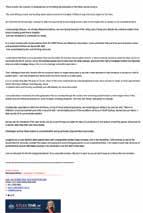
“They haven’t budged on anything we’ve asked for – they put the kibosh on every claim the moment we ask for it,” she said.
11May2023
“That has only made us more determined to continue the campaign. It’s actually strengthened the solidarity between nurses at both hospitals.
“We are totally unified in our desire to achieve patient-focused teamwork using best and safest practice. Unless they give us ratios, they are not enabling us to achieve teamwork, best practice and safe practice.”
She said if management continued to reject ratios, nurses and midwives would leave to take jobs in the public sector where the state government has committed to introducing ratios. Sydney’s biggest private hospital, Sydney Adventist, agreed to ratios last year.

Speaking at the International Nurses Day rally, secretary of the NSWNMA branch at St Vincent’s Private, Kate Westwood, congratulated
“We walked across the street together to the rally in Green Park. Cars were honking their horns, even the ambulances were giving us toots with their sirens. There was so much camaraderie – it was fantastic.”
Dear Nurses and Midwives fromTheMaterandStVincentHospitals.HappyInternational NursesDay.IamsosorryIcannotbewithyoutodaybuthavebeenwatchingyourfightforrespect –ratiosandafairpayriseformanymonths. Youhavemy100%supportaswellasthesupportoftheentireunionmovementinyour fight.Itisajustfightandwhenyouwin,whichyouwill,itwillchangetheworkinglivesof nurses and midwives whocomeafteryouandthepatientsofbothtodayandtomorrow. Unfortunately,changedoesnotusuallycomebyjustaskingthosewithpowertodothe rightthing.Whentheydonotlisten,youhavethechoiceofgivinguporofunitingtobuild powertheycannotignore.Thisiswhatyouhavechosenanditishowchangehappens. OnethingIknowisthatifyoudonotfight,youlose.Youcanonlygoforwardonceyou have madethecommitmenttouniteandsupporteachother.

Bestwishesandsolidarity.
SallyMcManus


26 | THE LAMP JUNE / JULY 2023 PRIVATE HOSPITALS
‘Unless they give us ratios, they are not enabling us to achieve teamwork, best practice and safe practice.’
— Mary-Anne Renshaw, NSWNMA Mater Hospital delegate
all members who joined the industrial action.
“It takes courage to seek change,” she said.
“Over the last eight months of our campaign we have learned a lot. “We have strengthened our communication networks, united together in solidarity, met with political allies and now have a state government that is committed to rolling out ratios in our public hospitals.”
Kate said that during negotiations, member representatives had “delivered very compelling statements about workload burdens, moral duress, patient care and safety”
to management.
Despite this, SVHA had offered nothing to address the “crushing workloads and unsafe staffing”.
“Despite our cries for help, the SVHA leadership team is choosing to ignore its nursing workforce and resist reform.”
Kate said the state Labor government’s commitment to mandatory ratios “has left me and my private hospital colleagues concerned we will be left behind”.
“We cannot afford to let our brilliant nurses leave us for the public system.” n
Messages of solidarity and support
Speakers at the St Vincent’s Health rally in Darlinghurst included police Inspector Matt Hanlon from the Kings Cross Local Area Command.


He said it was “a privilege to have the hospital and its services available both to the community and ourselves”.
“As frontline workers we know full well the difficulties you experience and recognise the value you have as frontline workers as well,” Inspector Hanlon said.
“It is a very important message you’re sending today, and I acknowledge that and want to let you know on this International Nurses Day we (police) appreciate you as frontline workers and know that we couldn’t do the job without you.”
The rally heard messages of solidarity and support from ACTU President, Sally McManus; federal member for Sydney (and Environment Minister), Tanya Plibersek; and the Independent federal member for North Sydney, Kylea Tink.
Sally McManus said the SVHA nurses and midwives are waging a just fight.
“When you win, which you will, it will change the working lives of the nurses and midwives who come after you and the patients of both today and tomorrow,” she said.
Tanya Plibersek said the number of stop-work meetings held by the
nurses and midwives highlighted the seriousness of the issues.
She added, “I hope a positive end to your negotiations is in sight. Keep up the fight!”
Kylea Tink said that in her electorate of North Sydney, rents are above the state average, and more than half of mortgage holders report they are under mortgage stress.
“I support you in your fight for safer patient ratios and a desperately needed wage increase,” she said.
“And in the meantime, I will continue to call on the government to seriously consider the impact of housing and cost-of-living pressures on our essential workers.
“I am ready to work with all levels of government to ensure affordable housing in my electorate is not the stuff of fairy tales.”
THE LAMP JUNE / JULY 2023 | 27 PRIVATE HOSPITALS
I hope that a positive end to your negotiations is in sight. Keep up the fight!’
— Federal Member for Sydney Tanya Plibersek
‘I support you in your fight for safer patient ratios and a desperately needed wage increase.’
— Federal Member for North Sydney Kylea Tink
‘As frontline workers we know full well the difficulties you experience and recognise the value you have as frontline workers as well.’
— Police Inspector Matt Hanlon
than ever stronger a voice for change

nsw
keynote speaker
Stan Grant
Stan Grant is the International Affairs Editor for the ABC, a multi-award winning current affairs host, author and adventurer.

Well known for having brought the former Prime Minister Malcolm Turnbull to tears when interviewed about Indigenous affairs on The Point, Stan’s keynotes are insightful, engaging, always professional and at times, controversial.
Stan’s Aboriginal heritage has shaped his dynamic, resilient personality. Born in Griffith NSW, his mother is from the Kamilaroi people and his father is of the Wiradjuri.
Stan has won many major awards including an Australian TV Logie, a Columbia University DuPont Award and the prestigious U.S Peabody Award. He is a four-time winner of the highly prized Asia TV Awards, including reporter of the year.
closes Sunday 20 August
28 | THE LAMP JUNE / JULY 2023
ICC, Sydney 30 August – 1 September 2023
register now nswnma.info/pd2023
Early-Bird Rate (register by 30/7) Full Rate (31/7 – 20/8) Members $110 $160 Non-members $160 $240 Retired associate members and student members $75 $100 Branch Officials* Free Free * Delegates will receive email invitation to register to all 3 days of annual conference
Registration
professional day COUNT TOWARDS CPD HOURS
3o august 2023 icc Sydney, pyrmont theatre
nurses and midwives
wednesday
Sophie Scott
Sophie Scott is a multi-award winning journalist and the reporter and presenter of medical and health news for
speakers
Prof James Buchan
Recover to Rebuild: Investing in the Nursing Workforce for Health System Effectiveness
Prof. James Buchan is a Senior Fellow at the Health Foundation in London UK, an adjunct professor at the UTS, and a visiting professor at the University of Edinburgh. He is also a Trustee of the Florence Nightingale Foundation.

He has thirty years experience of policy research on health sector human resources, specialising in the nursing workforce and in international and national level strategy, policy and planning; pay, incentives and reward strategy; and labour market analysis.
Prof Mary Chiarella AM
Philosophy, persuasion, perfidy, persistence and passion– the politics of primary health care
Mary has served as the Chief Nursing and Midwifery Officer, NSW Health Department and as Foundation Professor of Nursing in Corrections Health, with the University of Technology, Sydney. She was awarded an AM in 2019 for her significant contributions to nursing and midwifery education and healthcare standards.
Mary is Deputy Chair of Northern Sydney LHD and chairs their Health Care Quality Committee. She also serves on the Australian Health Ethics Committee of NHMRC, the Health Ethics Advisory Panel to the NSW Minister for Health and the Clinical Governance Advisory Committee to healthdirect Australia. She serves the NSW Nursing and Midwifery Council as a panel and Tribunal member for impairment, performance and conduct matters.
Mary’s research interests focus on legal, policy and ethical issues in nursing, midwifery and health care delivery. She publishes and speaks nationally and internationally on her work. She
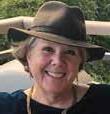
ABC news, radio, 730, ABC News Channel and ABC online. Recognised for her ability to clearly communicate complex subject matter, the stories she has developed on patient safety have led to changes in the regulation of cosmetic surgery in Australia.
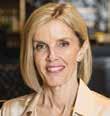
has undertaken a number of projects for the World Health Organisation and has been a Visiting Scholar to ICN.

Saba Akbar
Artificial intelligence in nursing: applications and opportunities.
Saba Akbar is an RN with diverse work experience in areas of surgical nursing, nursing education and patient safety with a PhD from the Australian Institute of Health Innovation, Macquarie University.

Her research focuses on the use of artificial intelligence (AI) to enable decision support systems for nursing assessments, which are critical for identifying and managing clinical risks in hospitalised patients. Saba is passionate about using digital health for enhancement of patient safety and benefit of the nursing community.
Dr David Lyell
Dr David Lyell is a Postdoctoral Research Fellow from the Australian Institute of Health Innovation, Macquarie University. David is interested in how humans interact with decision support systems such as expert systems and artificial intelligence. His research interests focus on how decision support technologies change human decisionmaking and how that impacts patient safety.
The Climate and Health Alliance (CAHA)

Sustainability in Healthcare
CAHA is Australia’s peak body on climate and health. Since 2010, CAHA has employed effective evidence-based advocacy, a collaborative approach and a willingness to engage professionals, policymakers and media. A panel of speakers will discuss how nurses and midwives can be part of the solution.
COVER STORY THE LAMP JUNE / JULY 2023 | 29
mc
PROFESSIONAL EDUCATION
Face-to-face CPD Education Opportunities
Waterloo
Law, Ethics and Professional Standards in nursing and midwifery
Thu 20 July & Thu 23 Nov, 9am–4pm, 6 CPD Hrs
Wound Care Essentials
Thu 10 Aug, 9am–4pm, 6 CPD Hrs
Medicinal Cannabis Seminar for Nurses and Midwives
Fri 29 Sep, 9am–4pm, 6 CPD Hrs
Mental Health and Drug & Alcohol Nurses Seminar
Fri 13 Oct, 9am–4pm, 6 CPD Hrs
Consumer Consultation and Complaints
Tue 17 Oct, 9am–3pm, 5 CPD Hrs
Environmental Sustainability Seminar (rescheduled date)
Fri 3 Nov, 9am–4pm, 6 CPD Hrs
Child and Family Health Seminar
Fri 10 Nov, 9am–4pm, 6 CPD Hrs
Newcastle
Medications: How we do it better
Thu 8 June, 9am–4pm, 6 CPD Hrs
Clinical Communication and Documentation
Thu 19 Oct, 9am–4pm, 6 CPD Hrs
bit.ly/educationNSWNMA
Orange
Medications: How we do it better
Tue 25 July, 9am–4pm, 6 CPD Hrs
Batemans Bay
The Deteriorating Patient
Wed 1 Sep, 9am–4pm, 6 CPD Hrs
Wagga Wagga
Nursing and Midwifery
Professional Roadshow
Fri 17 Nov, 9am–4pm, 6 CPD Hrs
Wollongong
Medications: How we do it better
Tue 28 Nov, 9am–4pm, 6 CPD Hrs
Keep an eye on the education page and our education emails for updates and additions. Go online for more information about each course, registration and searching our webinar CPD education options. Please note: 2 working days’ notice is required for course cancellations. Read the full Education Cancellation, Refund and Catering Policy available on the Association’s website prior to registering for courses.
NSWNMA live webinars
with Jessica Stokes-Parish
Practicing intensive care nurse, educator and influencer with a PhD in Medicine
Both webinars will be recorded and made available in Member Central for a strictly limited period of 7 days following. Register to be notified when they are online and ready to view.
The Good Influencer: Tips and strategies for social media influencing
Tuesday 13 June, 7–8.15pm
As a nurse or midwife influencer, the stakes are high when having a presence on social media. The ramifications can have financial and reputational cost. Jessica will present 5 principles of ethical social media practice, exploring the finer details of expectations on you as a professional.

Fundamentals of science communication
Tuesday 20 June, 7–8.15pm
For many nurses and midwives, using social media to engage with the public about science became “a thing” during the pandemic. Science communication presents us as health professionals an opportunity to engage in dialogue, shift some of the power imbalances, and create space for the patient’s voice.
Register
Specialty Seminars TRADE UNION
The NSWNMA is resuming our range of specialty seminars in 2023! Hear from a range of speakers, network with colleagues and share experiences with like-minded colleagues.
BLACKTOWN
Aged Care Nurses Seminar
Friday 15 September
For RNs, ENs and AINs in residential, community and hospital aged care settings, across private and public sectors, or anyone with an interest in the aged care sector in NSW.
WATERLOO
Medicinal Cannabis Seminar for Nurses and Midwives
Friday 29 September
Hear from clinicians from Australia and Canada about the successes, the barriers and the future for medicinal cannabis in Australia.
Mental Health and Drug & Alcohol Nurses Seminar
Friday 13 October
Hear from a range of speakers, network with colleagues, from residential, community & hospital areas, across mental health and D&A sectors.
Seminars scheduled in November
Environmental Sustainability Seminar
3 November (rescheduled from 2 June) Waterloo
Child and Family Health Seminar
10 November Waterloo
Nursing and Midwifery Roadshow
2023 ASSOCIATION MEMBER TRAINING CALD Branch Essentials
FOR
NSWNMA Office
50 O’Dea Avenue, Waterloo
Let’s get active to tackle workplace bullying and racism. Sign up for this course and learn how to make the most of your Union. Help solve workplace issues that are important to you, learn how to take bystander action to address racism and bullying and learn skills to have effective conversations challenging racism.
This course is open to all NSWNMA members and is free. You may also be eligible for free travel, overnight accommodation and pay for any missed work.
bit.ly/NSWNMA-AMT REGISTER NOW!
Lunch and refreshments
will be provided You will
17 November, Wagga Wagga. via bit.ly/educationNSWNMA
TRAINING
NSWNMA MEMBERS
20 – 21 September 9am – 5pm
Scan the QR code or go to
receive a
FREE forallNSWNMA members!
TIME: each seminar will commence at 9am and conclude around 4pm. COST (per seminar): Members $75 • Non-Members $150
CPD certificate of attendance
Ask Shaye When it comes to your rights and entitlements at work, NSWNMA General Secretary Shaye Candish has the answers.

Some changes at last
In the last edition, members were encouraged to use the then upcoming state election as a referendum on who would best deliver safe patient care in a safe workplace. Many other government sector workers, their families and friends, along with concerned community members, did likewise on a range of issues impacting essential workers. Pleasingly, with the election of a Minns ALP government, action has commenced to implement the promises made to public health nurses and midwives to revamp and upgrade staffing and accountability.
Progress is also continuing federally in aged care via the work value case and legislation requiring nurses 24/7 and a minimum number of nurse/care minutes per resident. There were also some good announcements for health care in the recent federal budget. But, as always, all the above progress is underpinned by your existing workplace entitlements and enforcing them effectively. Let’s get to it …
Night shifts in a 12-hour roster
We are about to start working a 12-hour roster system in a public hospital unit. What is the breakdown of day shifts to night shifts?
Under Clause 5(v)(i) of the Public Health System Nurses’ and Midwives’ (State) Award, no more than 50 per cent of shifts should be night shifts unless it has been otherwise agreed between staff and the manager of the unit. Remember, you also can’t be asked to work overtime that extends your 12-hour shift.
Rectifying an underpayment at Ramsay
I work in a hospital operated by Ramsay. How quickly do they need to rectify an underpayment
of wages?
Under Clause 7.4 of the Ramsay Health Care Australia Pty Limited and NSW Nurses & Midwives’ Association and ANMF NSW Branch Enterprise Agreement 2021–2023, when
an underpayment occurs the hospital should rectify the error as soon as possible and, on the next day, that pay is due. But, where the underpayment creates serious financial hardship (defined as wages over $100), the hospital will make a special payment outside of the usual pay arrangements, and within one day where practicable.
Flexibility with working hours
I work in a public hospital and need to vary my working hours to assist with some nonwork issues. My manager has mentioned I’ll need to get a TIRA. Can you explain what that is?
A TIRA is a ‘Temporary Individual Roster Agreement’. These are entered into when personal circumstances change and some flexibility is needed to better balance work and family life, for example, until the issue is resolved. The ‘NSW HealthShare Roster Resource Manual’ has a sample TIRA request form, although your
manager should be able to provide you with one. These are temporary and are usually reviewed every three to six months. Once applied for, a response should be given within 14 days and, if the application is rejected, the reasons should be provided.
Part-time hours at Opal
I am about to start part-time work in an Opal nursing home. Is there a minimum number of hours I can be contracted for?
Under Clause 11.3 of the Opal Aged Care (NSW) Enterprise Agreement 2016, a part-time employee is someone engaged to work less than an average of 38 hours per week. The minimum engagement of ordinary hours for a part timer is a minimum of three hours (also set out in this clause). So, all in all, a broad span of hours that can be contracted for.
Break between shifts
My roster has shifts with only an eight-hour break. Is that permitted in public health?
Under Clause 4(iv) of the Public Health System Nurses’ and Midwives’ (State) Award, you are entitled to a minimum ten-hour break between rostered shifts of ordinary hours unless you have agreed otherwise. Your manager may believe you have agreed to or signed a 10-hour break waiver form, which would permit such a rostering practice. If you haven’t signed one or agreed otherwise, let your manager know the roster will need to be adjusted to reflect your award entitlement.
32 | THE LAMP JUNE / JULY 2023
YOUR RIGHTS
Superannuation increase
When is the next increase to employer superannuation contributions happening?
The May 2023 Federal Budget confirmed the maintenance of the Super Guarantee’s legislated increase to 12 per cent. From 1 July 2023, the Super Guarantee payable by employers will increase from 10.5 per cent to 11 per cent. It will continue to increase by 0.5 per cent on 1 July each year until it reaches 12 per cent in 2025.
Notice of roster at Healthscope
When should a new roster be put out in a hospital operated by Healthscope?
Under Clause 10 of the Healthscope – NSWNMA/ANMF – NSW Nurses’ and Midwives’

– Enterprise Agreement 2020–2024, a roster giving two weeks’ notice is required for full-time and part-time employees. The roster should be displayed in a place conveniently accessible to employees. Check out the clause for further information as to when a posted roster can possibly be changed by either the hospital or employee.
Higher-grade duty
When I work up a grade as a NUM, does the position need to be vacant to get paid highergrade duty? I work in a public health service.
If you are called upon to work or relieve in the NUM position, you should be paid higher-grade duty, whether the position is substantively vacant or not. Remember, to get the payment, you will need to undertake five working days consecutively in
the role. Check out Clause 24(i) of the Public Health System Nurses’ and Midwives’ (State) Award for all the details.
Minimum shift at Estia
What is the minimum shift length when working at a nursing home run by Estia?

Under Clause 21.1 of the Estia Health NSW Enterprise Agreement 2019, the minimum engagement (or payment) is two hours for casuals, and four hours for all other staff.

THE LAMP JUNE / JULY 2023 | 33
YOUR RIGHTS Out now! Listen on NSWNMA’s fortnightly podcast Nursing under Apartheid Dispelling stigma about substance abuse The Road to Ratios
Cavell Edith
TRUST BEQUESTS
The Trust – named in honour of Edith Cavell – assists in the advancement of NSW nurses, midwives and assistants in nursing/midwifery through further studies and research, made available through scholarship. The knowledge and expertise gained by nurses, midwives and assistants in nursing/ midwifery, supported by the Edith Cavell Scholarships, is an asset to the care of their patients and clients. Bequests to the Trust continue to support this important work.
Edith, a British nurse serving in Belgium in WW1, is a hero to most nurses and midwives. She helped some 200 Allied soldiers escape from German-occupied Belgium. Her actions saw her arrested, accused of treason, found guilty by a court-martial and sentenced to death. Despite international pressure for mercy, she was shot by a German firing squad.
NAME
ADDRESS
EMAIL
PHONE BEQUEST/ DONATION AMOUNT $
PREFERRED METHOD OF PAYMENT
Electronic Fund Transfer Account name: Edith Cavell Trust Bank: Commonwealth Bank BSB: 062-017 Account no: 10017908
Credit Card
I authorise the Edith Cavell Trust (processed via NSWNMA) to debit my credit card for the amount of $
Mastercard Visa Name on Card
Card no
Signature of Cardholder
Expiry Date /
SCHOLARSHIPS FOR THE ACADEMIC YEAR 2024

Applications for the Edith Cavell Trust Scholarships are being accepted from 1 May 2023, closing 31 July 2023, for studies being undertaken in the academic year 2024.

Members or Associate Members of the NSW Nurses and Midwives’ Association or the Australian Nursing and Midwifery Federation (NSW Branch) are invited to apply.
All grants, awards or loans shall be made to financially assist nurses, midwives, assistants in nursing, assistants in midwifery (including students of those disciplines), and accredited nursing or midwifery organisations, schools and faculties in the furtherance of:
(i) accredited nursing or midwifery studies;

(ii) such academic research programs as are approved by the Trustees in the theory or practice of nursing or midwifery work; or
(iii) clinical nursing education programs at graduate, post-graduate and continuing education professional development level; in accordance with a number of categories.
Full details of the scholarship categories, how to apply and to obtain the official application form is available from the NSWNMA website. Prior to applying, please ensure you have read the Edith Cavell Trust Scholarship Rules.
The Edith Cavell Trust is now able to receive non-tax deductable donations/bequests.
www.nswnma.asn.au CLICK ON ‘EDUCATION’ For further information contact: Scholarship Coordinator, The Edith Cavell Trust 50 O’Dea Avenue, Waterloo NSW 2017 T 1300 367 962 E edithcavell@nswnma.asn.au APPLICATIONS CLOSE 5PM ON 31 JULY 2023
Take a look at these fabulous holiday offers
Never pay full price for a holiday again
Ubookdirect offers all NSWNMA members discounted rates on 1000's of hotels Australia wide. Fill in a quote request today to save on your next getaway.
UBOOKDIRECT is giving members a $20 voucher to use on any already discounted member package when booking through the Concierge. To book one of these fantastic destinations log on to https://travelbenefits.ubookdirect.com and click on the ENQUIRY tab or call 1300 959 550.
50% OFF!
Return to Paradise Resort Samoa
Visit beautiful Samoa for an incredible $799 for 5 nights. Rate covers 2 adults in a Garden View Room with the following inclusions:
• Daily breakfast
• UPGRADE to a Beachfront View Room for just $200

Experience Samoa's tropical paradise at Return to Paradise Resort. With its beachfront location it is the perfect setting for a romantic escape or a fun-filled family vacation. Relax and enjoy your own private verandah or explore all the island has to offer.
40% OFF!
30% OFF!
Rahaa Resort Maldives
Relax in luxury in your private Ocean View Villa with full board – $1699 pp for 2 adults (minimum 5-night stay) with the following inclusions:
• Full board (breakfast, lunch and dinner) for two guests
• Domestic flights and speedboat transfers for two-guests

Enjoy a private and peaceful stay with views of the Indian Ocean. Rahaa Resort offers a relaxing spa, a choice of restaurants and several excursions including dolphin watching, fishing trips, snorkelling and sunset sailing.
Limited offer! Send an enquiry for your requested dates today! Use your $20 voucher to save even more on these offers.
Park Regis City Quays Cairns
Stay in the heart of Cairns in a dual key 2-bedroom apartment (minimum 3-night stay) for just $299 per night.
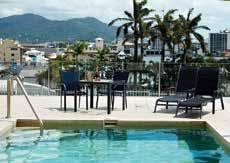
• Free cancellation 7 days prior to check-in
• Free WiFi
• Fully equipped kitchen & laundry, balcony with outdoor setting
• Reef and tour information
• Executive hotel rooms also available for just $70 per night pp (min 3 nights for 2 adults) Featuring a beautiful rooftop swimming pool to relax and recharge. A short stroll away from the Esplanade, harbour foreshore, restaurants, shops, night markets, Reef Casino and Marlin Marina.
ALL OFFERS: For full t&c’s go to https://travelbenefits.ubookdirect.com . Subject to availability and block-out dates. Samoa: valid for travel until 31 March 2024. Rate based on 2 adults for a min 5-night stay (2 x children can be added with extra person cost added at time of booking). Maldives: valid for travel until 15 July 2025. Rate based on 2 adults for a min 5-night stay (villa sleeps up to three guests with additional gusts added at time of booking). Cairns: valid for travel until 31 March 2024 and based on a min 3-night stay.

THE LAMP JUNE
JULY 2023
35
COVER STORY
/
|
TRAVEL
$20FREE voucher
COVID-19 is no longer a global health emergency: WHO

The emergency is over but the world must remain vigilant, says global body.
The WHO director general, Tedros Adhanom Ghebreyesus announced in May that the UN health agency was downgrading COVID’s alert status that had been in place since 30 January 2020, The Guardian reported.
But he warned that COVID remained a persistent threat with the disease still killing someone every three minutes.
Tedros said the decision to downgrade the alert status did not mean the danger was over, cautioning that the emergency status could be reinstated if the situation changed. He pointed out that long COVID impacted one in 10 people who had contracted the virus and hundreds of millions of people could still need long-term care.
“The worst thing any country could do now is to use this news as a reason to let down its guard, to dismantle the systems it has built, or to send the message to its people that COVID -19 is nothing to worry about,” he said.
COVID has officially claimed more than 6.9 million lives, and affected the health of more than 765 million others, according to WHO. It said the true figures were likely to be much higher and an ongoing commitment to public health was essential.
“It is critical for governments to invest long-term in their health system and workers,” said Tedros Adhanom Ghebreyesus.

36 | THE LAMP JUNE / JULY 2023 Call the NSWNMA on 1300 367 962 and find out how you can access this great service Quality legal advice for NSWNMA members • Workers Compensation Claims • Litigation, including workplace related claims • Employment and Industrial Law • Workplace Health and Safety • Anti-Discrimination • Criminal, including driving offences • Probate / Estates • Public Notary • Discounted rates for members including First Free Consultations for members Offices in Sydney and Newcastle with visiting offices in regional areas (by appointment) NEWS IN BRIEF WORLD
“It is critical for governments to invest long-term in their health system and workers.”
— WHO director general, Tedros Adhanom Ghebreyesus
1 in 6 globally affected by infertility
The prevalence is ‘staggering’ says the World Health Organization.
Around 17.5 per cent of the adult population – roughly 1 in 6 worldwide – experience infertility, showing the urgent need to increase access to affordable, high-quality fertility care for those in need, says WHO.
In a call to action, the WHO recommended that countries offer universal health coverage of fertility treatments, pointing to many European countries, as well as Morocco (which has made fertility treatment available in the public sector), and Indonesia (which includes it in primary care services) as leading the way.
The report analysed 133 studies from 1990 to 2021, defining infertility as a disease where a person fails to conceive a pregnancy after one year or more of regular, unprotected sexual intercourse.
There are major disparities between high-income and low-income countries when it comes to accessing treatment such as in-vitro fertilisation.
“The costs of fertility care are an immense challenge for many people,” said Pascale Allotey, director of sexual and reproductive health and research at the WHO.
Around the world, most people pay out-of-pocket for fertility treatment. In the United States, a single round of IVF typically costs US$15,000 to US$20,000.

Patients in low-income countries without public financing options often pay significantly more than their entire annual income for one round of assisted reproductive technology. Such high costs create “a medical poverty trap for those affected,” Allotey said.
AUSTRALIA
‘Privatisation is politically dead’
Voters in NSW followed the trend in other states and rejected the further sell-off of public assets
The NSW Labor victory in the recent state election – when it ruled out any further privatisation of state-owned assets – is the latest in a trend of state Labor parties winning big on anti-privatisation platforms, says the Centre for Future Work (CFW).
“At last November’s Victorian election, Victorian Labor pledged to recreate the State Electricity Commission (SEC). This promise was widely cited as the ‘cutthrough’ issue that led to that party’s dominant victory,” said Charlie Joyce, a researcher at the CFW.
Victorian Premier Dan Andrews called for electricity to be run for people and not for profit.

“Privatisation has failed. It’s failed pensioners, it’s failed families,” he said.
Earlier last year, South Australian Labor also returned to government, after only one term in opposition, pledging to return the recently privatised state railway network to public ownership.
In Queensland, Labor Premier Annastacia Palaszczuk’s government has affirmed its opposition to privatisation and supported public ownership.
“Public ownership is popular – and it’s no mystery as to why. Publicly owned enterprises provide consistently cheaper and more reliable services because they are run for public good, not private profit. On the other hand, the owners of privatised services have strong incentives to cut corners and raise prices in pursuit of higher profit margins. This consistently leads to privatised services being more expensive and less reliable,” said Charlie Joyce.
THE LAMP JUNE / JULY 2023 | 37 NEWS IN BRIEF WORLD
‘The costs of fertility care are an immense challenge for many people.’
— Pascale Allotey, WHO.
‘Privatisation has failed. It’s failed pensioners, it’s failed families.’
— Dan Andrews, Victorian Premier
The silver lining in COVID: solidarity
World Happiness Report finds higher levels of benevolence in all global regions than before the pandemic. Interviews with more than 100,000 people across 137 countries found significantly higher levels of benevolence in all global regions than before the pandemic, The Guardian reported.
Things were slightly worse in Western countries and slightly better in the rest of the world, but overall “the undoubted pains were offset by increases in the extent to which respondents had been able to discover and share the capacity to care for each other in difficult
times,” the 10th World Happiness Report found.
“It’s amazing,” said John Helliwell, a professor of economics at the University of British Columbia and a co-editor of the report.
“People ended up discovering their neighbours. People were checking in more regularly [with other generations], so that sense of isolation was not as much as you would expect.”
Acts of everyday kindness that have been shown to boost happiness, such as helping a stranger, donating to charity and volunteering –activities spurred by the needs of lockdowns – are now above prepandemic levels.
The study found the happiness effect of “having someone to count on in times of trouble” increased during the pandemic and since 80 per cent of people surveyed said they did have someone to count on, that had a significant effect.
English nurses stand firm on pay

Members of the Royal College of Nursing (RCN) mark May Day with another 24-hour stoppage – their third strike this year While some employees within the National Health Service accepted a 5 per cent pay offer from the government, nurses belonging to the RCN and junior doctors from the British Medical Association (BMA) have vowed to continue their campaign for fairer pay rises.
RCN members had never gone on strike in their 106-year history until last year. The 280,000 members are now poised to vote on whether to escalate the strikes.
If RCN members vote in favour of further strike action, the union will have a mandate by law to conduct strikes for a further six months across the full NHS.
Another NHS union – Unite – also rejected the government’s pay offer.
“It is quite frankly a joke that NHS workers are being forced to fight for a decent pay rise after years of pay freezes and all their sacrifices during the pandemic,” said Unite general secretary Sharon Graham.
Unite said “the government is choosing to let the NHS collapse”. RCN general secretary Pat Cullen said it was regrettable that strike action had to be taken but that the government needed to improve its pay offer.
“Nursing staff are looking for a fair settlement that shows the government values and understands their profession. We appear a long way from that currently,” she said.
38 | THE LAMP JUNE / JULY 2023
WORLD
NEWS IN BRIEF Qualify to become a registered midwife with a Graduate Diploma of Midwifery or Graduate Certificate in Contemporary Midwifery. Notre Dame’s postgraduate programs are flexible, so your study works for you. Apply now for Semester 2, 2023
The study found the happiness effect of ‘having someone to count on in times of trouble’ increased during the pandemic.
Ready
to fit postgrad study into your life? Now is your moment.
BRITAIN
“The government is choosing to let the NHS collapse.” — Unite
GERMANY
German nurses strike for better pay
Germany has been rocked by its biggest strikes in 30 years as the cost of living explodes.
German nurses and other health workers carried out “warning strikes” at the end of March as part of a pay campaign supported throughout the public sector.
Hospitals, psychiatric clinics, aged care facilities and emergency services were affected nationwide.
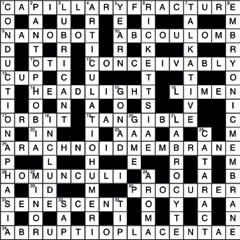
The strike came after health workers rejected an employer offer of a 3 per cent pay rise this year and a 2 per cent increase next year with a 2500-euro bonus spread over the two years.
Inflation in Germany is currently running at nearly 9 per cent. Ver.di, the public sector union that covers health workers is calling for a 10.5 per cent pay rise.
The German government has been making significant cuts to health spending during an economic crisis while at the same time pledging to increase military spending by more than 100 billion euros.
The health workers’ strike coincided with industrial action by 2.5 million workers in the service sector and by 230,000 railway workers.
It was the largest strike in Germany since 1992.
“Employees are fed up with being taken for a ride in collective bargaining,” Ver.di President Frank Werneke told Le Monde .
Since the start of the year the union has added 70,000 new members. “This is the strongest growth we have seen in more than 20 years,” said Werneke.
AUSTRALIA ACTU calls out RBA on interest rate rises
The ACTU has called on the Reserve Bank of Australia to stop hurting workers with interest rate rises.
The latest rise of 0.25 per cent means there have been 11 increases since May 2022, with a brief pause providing next to no relief.
Working people are bearing the brunt of fixing inflation but the real driver is corporate profits fuelled by excessive price rises, says the ACTU.

ACTU Secretary Sally McManus says there is no wage-price spiral and it’s time to cease interest rate rises and for corporate Australia to moderate their profits.
“Working people are under immense pressure and this will make it worse. Ordinary Australians are struggling to pay the bills every time they go to the supermarket. Mortgages and rents have gone up an extraordinary amount as well.
“We can see inflation around the world coming down and that’s because it’s being driven by supply chain issues and by companies such as Qantas price gouging. The Reserve Bank should be calling that out, and putting pressure on companies to stop price gouging.
“The Reserve Bank is a very long way from the lives of ordinary Australians, who need wage increases just to keep their heads above water. Increases to the minimum wage and award wages this year are now more urgent than ever.”
THE LAMP JUNE / JULY 2023 | 39 NEWS IN BRIEF
‘Employees are fed up with being taken for a ride in collective bargaining.’
— Ver.di President Frank Werneke
CROSSWORD SOLUTION
“The Reserve Bank should be putting pressure on companies to stop price gouging.”
Sally McManus, ACTU Secretary
CHILD & FAMILY HEALTH REFERENCE GROUP

Are you a member of the NSWNMA?
The NSW Nurses and Midwives’ Association is seeking members to join the Child and Family Health Reference Group. The group meet a minimum of four times a year to discuss current issues and challenges in the sector. Meetings are held via Zoom to allow members to be involved regardless of geographical location.

Current NSWNMA members working in child and family health are invited to join.

Being a member of the Child & Family Health Reference Group gives you the opportunity to: be a voice for the issues impacting those working in the sector provide feedback to the Association assist in the development and reviewing of related policies
be a link between members and the Association
THE NSWNMA MEMBERS’ REWARD SYSTEM
Recruitment incentive scheme
Our collective strength is in our numbers – the larger the membership, the louder our voice. You can help build the NSWNMA by recruiting a member.
HOW THE SCHEME WORKS
$20




E-GIFTE-GIFT CARD
Once you have recruited 4 new members you will be entitled to an $80 e-gift card. For every new member you sign up after that, you will receive a $20 e-gift card.
Digital gift cards are emailed to recruiters at the end of financial year and valid for 3 years. Gift cards are not deemed to be income for the purposes of taxation.
*Conditions apply. To participate in this recruitment incentive scheme, you must be a financial member of the NSWNMA (Associate Members are not eligible to enter). Every new member’s application form must be accompanied by some form of payment – cheque, money order, direct debit, credit card authorisation form. Recruiter’s name and membership number must be written in the space provided on each new member’s application form. New recruits must remain as financial members for at least 3 months before being recognised by the scheme.
MORE INFORMATION + EXPRESSION OF INTEREST: DEAN MURPHY EMAIL: dmurphy@nswnma.asn.au PHONE: 0417 567 374
test your Knowledge
ACROSS
1. A fracture without separation of the fragments as seen sometimes in the skull (9.8)
9. A microscopic robot (7)
10. A unit of electrical charge (9)
11. Occupational Stress Injury (1.1.1)
12. Within the realm of possibility (11)
13. Poculum (3)
14. Surgeon’s lamp (4.5)
16. Entrance; the external opening of a canal or space (5)
17. The bony cavity containing the eyeball and its adnexa (5)
19. Touchable, real (8)
22. Symbol for indium (2)
23. Aminoadipic acid (1.1.1)
25. A delicate fibrous membrane forming the middle of the three coverings of the brain (9.8)
26. Diminutive humans (9)
29. Credential (1.1)
30. Acquirer, obtainer (8)
31. Growing old (9)
34. Premature detachment of a normally situated placenta (8.9)
DOWN
The inability to repeat words, sentences, or phrases as a result of a stroke, head injury, brain tumour or infection (10.7)
2. Morbid fear of everything (11)
3. An oily or slippery substance to reduce friction (9)
4. Glenohumeral joint (11.6)
5. Desire, long (5)
6. A micro-organism causing epidemic, murine or endemic typhus (11)
7. Chatty (9)
8. Protection to the embryo and provider of its nutrition, respiration, and excretion (9.8)
15. An organ that produces sex cells (5)
18. Contain (7)
20. A contest (4)
21. A mast cell (9)
24. Complete or partial opacity of the ocular lens (8)
27. Young person (5)

28. An agreeable odour (5)
32. The fluid of a living organism (3)
33. A point (3)
THE LAMP JUNE / JULY 2023 | 41 CROSSWORD
1 8 9 10 15 23 12 16 21 17 18 25 28 30 33 33 31 38 31 34 32 26 27 29 24 20 19 20 13 2 1 1 14 22 3 4 5 6 7 29 30




MERCHANDISE AD TO COME MEMBER CENTRAL LOGIN @ WWW.NSWNMA.ASN.AU ORDER VIA pride Wear with NSWNMA water bottle Metallic water bottle with infuser; stainless steel inside; for keeping hot and cold beverages Spend $60 and over to receive FREE POSTAGE $10postagefor ordersunder$60 The Unions for Yes campaign is proudly supporting the campaign for an Aboriginal and Torres Strait Islander Voice to Parliament and recognition in our constitution. Look great in this comfortable tee while making a meaningful contribution to a crucial cause and supporting the Voice to Parliament. Available
precision, care
craft. NSWNMA merchandise are sold at cost to members. ONLY $8 $25
in white, grey or blue; 100% Australian made and union made; 100% cotton; unisex (non-fitted) or fitted/women’s cut; made to last with Australian-made
and
BACK TO BANGKA –Searching for the Truth about a Wartime Massacre

Georgina Banks
Penguin Random House
RRP $34.99
ISBN 9781761341137
Georgina Banks searches for the truth of what happened to her Great-Aunt ‘Bud’, killed in the Second World War.
Bangka Strait, Indonesia, 1942. Allied ships are evacuating thousands in flight from Singapore, the island having fallen to Japanese Imperial forces. Facing terrifying assaults by fighter planes, one ship, the Vyner Brooke, is badly bombed and sinks. Its survivors swim or paddle for hours to the nearest land, a beach on Bangka Island, parched, many dreadfully injured.
One of the survivors is Australian Army nurse Dorothy ‘Bud’ Elmes, the greataunt of Georgina Banks. Bud makes it to the island, where she, colleagues and a matron tend to the wounded as a plan is formulated. But it is soon discovered the place is occupied by Japanese forces, and two days later they arrive on the beach.
All books can be ordered through the publisher or your local bookshop. Call 8595 1234 or 1300 367 962, or email library@nswnma.asn.au for assistance with loans or research. Books are not independently reviewed or reviewed using information supplied by the publishers.
Put some Concrete in your Breakfast: Tales from Contemporary Nursing — Building Resilience, Empathy and Confidence within a Challenging Profession

Stringer International Publishing
RRP $34.99
ISBN 9783031243929
This book gives a sincere yet honest representation of modern nursing in all its forms rather than purely focusing only on the good, the funny, the sad and the ugly. It provides a collection of stories that concentrate on nursing: validating, educating and encouraging those undertaking a nursing career.
THE COLLECTED REGRETS OF CLOVER
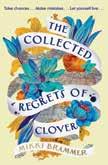
Mikki Brammer
Penguin Random House
RRP $32.99
ISBN
9780143779001
A big-hearted and life-affirming novel that turns the normally taboo subject of death into a reason to celebrate life! A sparkling debut novel from Australian Mikki Brammer, which reminds us all to live our best life with fewer regrets.
In her work as a ‘death doula’, Clover Brooks ushers people peacefully through their last days, collecting their final words into three notebooks: ADVICE, CONFESSIONS and REGRETS.
S PECIAL INTERES T SPECIAL INTEREST
It also celebrates the amazing rewards the unique career of nursing has to offer for those who can find a way to persevere through the challenges.
This book is targeted at nurses who may feel a little overwhelmed with the world that is nursing but who wish to thrive and further their career. Discussion questions at the end of the book further add to the reflection and learning process of the reader.
SOMEONE ELSE’S SHOES
Jojo Moyes

Penguin Random House
RRP $32.99
ISBN
9780241415542
Nisha Cantor and Sam Kemp are two very different women.
Nisha, 45, lives the globetrotting life of the seriously wealthy, until her husband inexplicably cuts her off entirely. She doesn’t even have the shoes she was, until a moment ago, standing in.
That’s because Sam – 47, middle-aged, struggling to keep herself and her family afloat – has accidentally taken Nisha’s gym bag.
Now Nisha’s got nothing. And Sam’s walking tall with shoes that catch eyes – and give her career an unexpected boost.
THE LAMP JUNE / JULY 2023 | 43
REVIEWS book club
Rasa Kabaila
Your
membership brings you exclusive cost of living savings

Fuel
New fuel discounts every month
Groceries
“Always on” discounts at your preferred grocers
Travel
Incredible savings on hire cars, accommodation and so much more!
To start accessing your rewards, login at:
online.nswnma.asn.au
Roz Norman was an outstanding activist, branch official and Councillor of the NSWNMA and ANMF. In honour of her outstanding contributions, the Roz Norman Scholarship was created to further humanitarian, social or community causes.
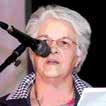
The scholarship covers fees for an approved course promoting activism and the development of campaigning skills or public advocacy, including ongoing financial support for reasonable costs associated with campaigning for a period of one year, up to a maximum of $5,000.
NSWNMA Branch Officials or highly active members who can demonstrate leadership qualities are encouraged to apply. Successful recipients are required to report back to Committee of Delegates (COD) at the end of the scholarship period.
Applications open 1 July, closing 30 September 2023
off
products
eStores
Promotions and special offers to save you money at your favorite retailers Check out the brand new savings calculator and discover how you can save everyday.
eStore Upto 50%
on a wide range of
in your
Shopping
Scholarship
apply go to bit.ly/RozNormanScholarship Further enquiries Email: education@nswnma.asn.au Metro: (02) 8595 1234 • Rural: 1300 367 962
Activism • Campaigning • Advocacy To
The Australian Journal of Advanced Nursing (AJAN) is the peer-reviewed scholarly journal of the Australian Nursing and Midwifery Federation (ANMF).
The mission of AJAN is to provide a forum to showcase and promote a wide variety of original research and scholarly work, to inform and empower nurses, midwives and other healthcare professionals to improve the health and wellbeing of all communities and to be prepared for the future.
Healthy sleep and nursing

Lisa Matricciani, et al
Poor sleep among nurses (and other healthcare workers) is a growing area of concern that may have far-reaching consequences not just for themselves, but also for their patients and the workforce. Fortunately, wellness programs are starting to integrate and highlight the importance of sleep for nurses, but this area of research still has a long way to go. Here, we discuss the importance of sleep for nurses, the challenges and future initiatives.
https://www.ajan.com.au/index. php/AJAN/article/view/1105
Recognising patients at risk of deterioration and dying on general medicine wards: a nurse-led point prevalence study
David JT Marco, et al
The timely recognition of patients who are at risk of dying is often complex and inherently uncertain. Compared to cancer, non-malignant conditions often present greater challenges in identifying patients at risk of dying, as the typical illness trajectory comprises a gradual deterioration in health and functional status, with only occasional acute exacerbations requiring a visit to hospital.
The burden of suffering at the end of life can be considerable when dying is not expected, affecting not just the patient but also their families. Palliative care is proven to offer individuals and families better quality care by providing effective symptom management and psychosocial support, reducing hospitalisations, and limiting the use of non-beneficial treatments at the end of life.
However, prompt and accurate identification of the deteriorating patient is essential so that these systems can be put in place to provide the most benefit.
A recent national audit showed greater than 70 per cent of hospital patients had documentation suggesting dying was recognised by a clinician but this occurred on average only one day before death. Furthermore, 66 per cent patients had potentially non-beneficial and invasive medical procedures performed in their final 48 hours of life.
These findings are reflected internationally, demonstrating widespread challenges in the management of dying people in hospital.
The Supportive and Palliative Care Indicators Tool (SPICT) was developed to help multidisciplinary teams identify patients at risk of deteriorating and dying in all care settings.
https://www.ajan.com.au/index. php/AJAN/article/view/960/182
Psychosocial impact of the COVID-19 pandemic on Australian nurses and midwives: a crosssectional study
Sara Holton, et al
The COVID-19 pandemic led to unprecedented and rapid changes to healthcare delivery, and evidence is emerging about the immediate impact of the pandemic on healthcare workers such as nurses and midwives. Symptoms of anxiety, depression and pandemicrelated stress or distress, as well as fear, nervousness, fatigue, frequent crying and suicidal thoughts have been reported. Nurses and midwives appear
to have experienced more psychological distress than other healthcare workers during the COVID-19 pandemic.
A recent Australian study conducted during the COVID-19 pandemic found that most of the hospital clinical staff surveyed were also concerned about their own health and infecting their families, friends and colleagues.
The aim of this study was to investigate the immediate psychosocial effects of the COVID19 pandemic on nurses and midwives working in acute care settings in Melbourne, Australia. The specific objectives of the study were to assess:
• nurses’ and midwives’ levels of depression, anxiety and stress;
• the proportion of nurses and midwives in the mild, moderate, severe and extremely severe diagnostic categories for depression, anxiety and stress;
• factors significantly associated with higher levels of depression, anxiety and stress;
• nurses’ and midwives’ selfreported concerns about COVID19; and
• the impact of the pandemic on their work and personal lives.
https://www.ajan.com.au/index. php/AJAN/article/view/638/181
Mental Health Reference Group
– call for papers
The NSWNMA Mental Health Reference Group will be convening a seminar at NSWNMA Head Office in Waterloo on Friday 13 October 2023. The theme of this seminar will be practice innovations. This is an opportunity to present your work in a supportive atmosphere, with plenty of opportunities for networking and professional engagement.
We invite all interested mental health, and drug and alcohol nurses who are engaged in innovative projects, to submit a short abstract to be considered for inclusion in this program. For further information contact MHRG@nswnma.asn.au.
THE LAMP JUNE / JULY 2023 | 45 NURSING RESEARCH AND PROFESSIONAL
ISSUES
health+wellbeing
Compassion and compassion fatigue
As nurses, midwives and students, you were probably drawn to the profession because you are compassionate and you want to help others, work closely with vulnerable people, and make a difference in their lives. Looking after other people all the time may take its toll, so it is important to look after yourself as well, and to try to avoid compassion fatigue.
The benefits of compassion
Compassion can actually make us less vulnerable, increase and motivate our strength to act, and increase our resilience and sustainability.
When we demonstrate compassion to another person, the hormone oxytocin is secreted from the pituitary gland, and this has a positive effect on our emotional, cognitive and social behaviours. Oxytocin improves our psychological stability, reduces our stress responses and enhances our trust.
What is compassion fatigue?
Compassion fatigue has been described as a “... state of significant depletion or exhaustion of the nurse’s store of compassion, resulting from repeated activation over time of empathic and sympathetic responses to pain and distress in patients and in loved ones” (Pembroke, 2015).
Nurses and midwives provide daily, hourly care for patients, and of families affected by illness. They may witness and respond to trauma, impending death, loss and grief. This may make nurses and midwives more vulnerable to experiencing the signs and symptoms of compassion fatigue.

The emotional investment may overextend a nurse’s or midwife’s ability to manage the demands of being compassionate and empathetic. This is a serious issue, and can impact directly and adversely on their physical, psychological and emotional health.
What are the signs of compassion fatigue?
Signs and symptoms of compassion fatigue include:
• exhaustion, absence of energy, feeling constantly mentally and physically tired
• apathy, sadness, no longer finding pleasure in activities
• questioning meaning and purpose of life
• depression
• anxiety
• difficulty in concentrating and functioning
• isolation from others both at work and/or socially
• difficulty in maintaining interprofessional relationships
• feeling detached from others
• insomnia
• reoccurrence of nightmares and flashbacks to a traumatic event
• unrelenting thoughts and concerns
• receiving an unusual amount of complaints from others
• chronic physical ailments such as gastrointestinal problems, chronic pain and headaches
• reduced motivation to maintain your own hygiene and appearance
• increased pessimism and suspicion
• increasingly blaming and being judgemental of others’ actions
• irritability and anger
• poor self-esteem.
Does everyone get compassion fatigue?
Not all nurses, midwives and students will experience compassion fatigue. In fact, professional satisfaction and motivation to practise is more common because the care provided ensures a compassionate approach. Frequently, those at risk of compassion fatigue provide high standards of care, and are well regarded by the team and by those in their care. This is important, as being aware of the risk of compassion fatigue occurring allows a conscious effort to prioritise and engage in activities that will help restore and balance energy.
It is normal to feel compassion fatigue at some stage in your career, as it can be draining looking after others all the time. If you do feel this way, there are lots of things you can do to look after yourself.

Poor coping behaviours
If you are feeling compassion fatigue, you may turn to coping behaviours that aren’t good for your health or the health of others around you. These could include:
• substance abuse, to manage and mask feelings
• compulsive behaviours such as overspending, overeating or gambling.
Self-care strategies
Self-care strategies include:
• engaging in healthy activities s uch as exercise, massage, yoga, and meditation
• eating a healthy and balanced diet
• drinking plenty of water
• ensuring you get sufficient rest and sleep
• remaining engaged in family and personal relationships
• organising your life so you become proactive as opposed to reactive
• participating in leisure and recreational activities.
If you are concerned, or others are raising concerns, taking no action will make you vulnerable to physical, emotional and psychological health problems. You have a responsibility to care for your own health needs, and it is important to be proactive in maintaining your own health and seeking support.
Nurse & Midwife Support provides free and confidential support 24/7 to nurses, midwives and students Australian wide. If you would like to speak to someone call 1800 667 877.
46 | THE LAMP JUNE / JULY 2023
BROUGHT TO YOU BY
YOUR
Update your details and win
Have you recently moved house or changed jobs?

Changed your classification or email?
Log on to online.nswnma.asn.au
Update your details
Go into the draw to WIN A TWO-NIGHT WEEKEND STAY AT WILDES BOUTIQUE HOTEL, KANGAROO VALLEY for two adults including:

2-night stay in a Fitzroy studio
Breakfast for two daily
A 3-course dinner at Wildes dining room

Late check-out
Half day bicycle use for two
WILDES BOUTIQUE HOTEL is Kangaroo

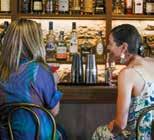


Valley’s hippest boutique hotel, the perfect retreat for wilderness explorers to relax and unwind. With its laid-back contemporary Californian Feel, it’s the perfect getaway and escape.
Everyone who uses our online portal from 1 April 2023 – 30 March 2024 to update their details will automatically be entered in the draw to win.
*The
be a financial
of the NSWNMA. Prize valid until 30 December 2024 and excludes stays over long weekend and school holiday peak periods. Booking and stay conditions may apply.
winner must
member


Eligibility criteria and conditions apply. Teachers Federation Health Ltd ABN 86 097 030 414 trading as Nurses & Midwives Health. A Registered Private Health Insurer NMH-NSWNMA-05/23



























































































